Installation and Maintenance of Heat Pumps
Boosting Heat Pump Efficiency: Optimized Refrigeration Cycle

We understand that enhancing the efficiency of the refrigeration cycle in heat pumps may seem daunting, but we want to assure you that we are here to help.
In this article, we’ll explore key components and strategies for boosting heat pump efficiency. From maintaining proper refrigerant charge to enhancing heat transfer in the evaporator and condenser, we’ll provide detailed insights to maximize performance.
Additionally, we’ll offer maintenance and troubleshooting tips to ensure optimal refrigeration cycle performance.
Let’s dive in and serve you with the knowledge you need to optimize your heat pump efficiency.
Key Takeaways
- Upgrading the compressor in a heat pump can improve performance and reduce energy consumption.
- Optimizing heat exchanger design and materials can maximize heat transfer efficiency.
- Ensuring the proper refrigerant charge is crucial for peak efficiency and energy savings.
- Enhancing heat transfer and minimizing pressure drop through evaporator and condenser enhancements, proper piping design, and regular maintenance can improve heat pump efficiency.
Understanding the Basics of the Refrigeration Cycle in Heat Pumps
We’ll start by explaining the fundamental principles of the refrigeration cycle in heat pumps. The refrigeration cycle is the heart of heat pump operation, responsible for the transfer of heat from one place to another.
It consists of four main components: the compressor, condenser, expansion valve, and evaporator. The cycle begins with the compressor, which compresses the refrigerant and raises its temperature. The high-pressure, high-temperature refrigerant then flows into the condenser, where it releases heat to the surroundings and condenses into a liquid.
The liquid then passes through the expansion valve, where it undergoes a pressure drop and becomes a low-pressure, low-temperature mixture. This mixture enters the evaporator, where it absorbs heat from the surroundings and evaporates into a gas.
With this understanding of the refrigeration cycle principles, we can now explore the key components for optimizing heat pump efficiency in the refrigeration cycle.
Key Components for Optimizing Heat Pump Efficiency in the Refrigeration Cycle
To optimize heat pump efficiency in the refrigeration cycle, there are two key components that require attention: compressor upgrades and heat exchanger optimization.
Upgrading the compressor can improve overall system performance by increasing its efficiency and reducing energy consumption.
Additionally, optimizing the heat exchanger, which is responsible for transferring heat between the refrigerant and the outside environment, can further enhance the heat pump’s efficiency.
Compressor Upgrades for Efficiency
One of the key components for optimizing heat pump efficiency in the refrigeration cycle is through compressor upgrades. Compressor technology advancements have played a crucial role in improving the energy efficiency of heat pumps. By incorporating energy-saving strategies into the design and operation of compressors, significant gains in efficiency can be achieved.
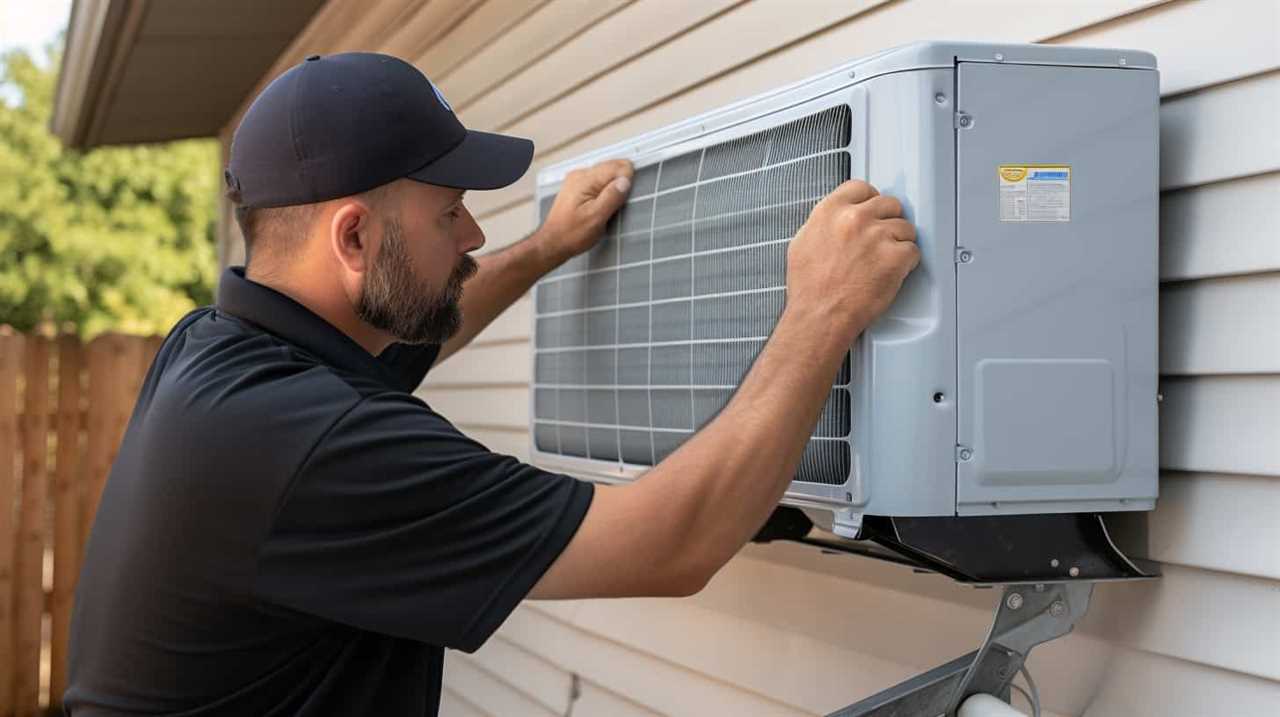
One such strategy is the use of variable speed compressors. These compressors can adjust their speed based on the heating or cooling demand, allowing for precise control of the refrigerant flow and reducing energy wastage. Additionally, modern compressors are equipped with advanced control algorithms that optimize their performance under different operating conditions.
Furthermore, improvements in compressor design and materials have also contributed to increased efficiency. For example, the use of scroll compressors, which have fewer moving parts and tighter tolerances, results in reduced energy consumption and improved reliability.
Heat Exchanger Optimization
Our focus now turns to heat exchanger optimization, a critical component in maximizing heat pump efficiency within the refrigeration cycle. Heat exchangers play a crucial role in transferring heat between the refrigerant and the surrounding environment. By improving heat exchanger design and enhancing thermal conductivity, we can significantly increase the overall efficiency of the heat pump system.
One key aspect of heat exchanger optimization is improving the design of the heat transfer surfaces. This involves maximizing the surface area available for heat exchange and ensuring proper fluid flow to facilitate efficient heat transfer. Additionally, incorporating materials with high thermal conductivity can enhance the effectiveness of heat transfer, improving overall system performance.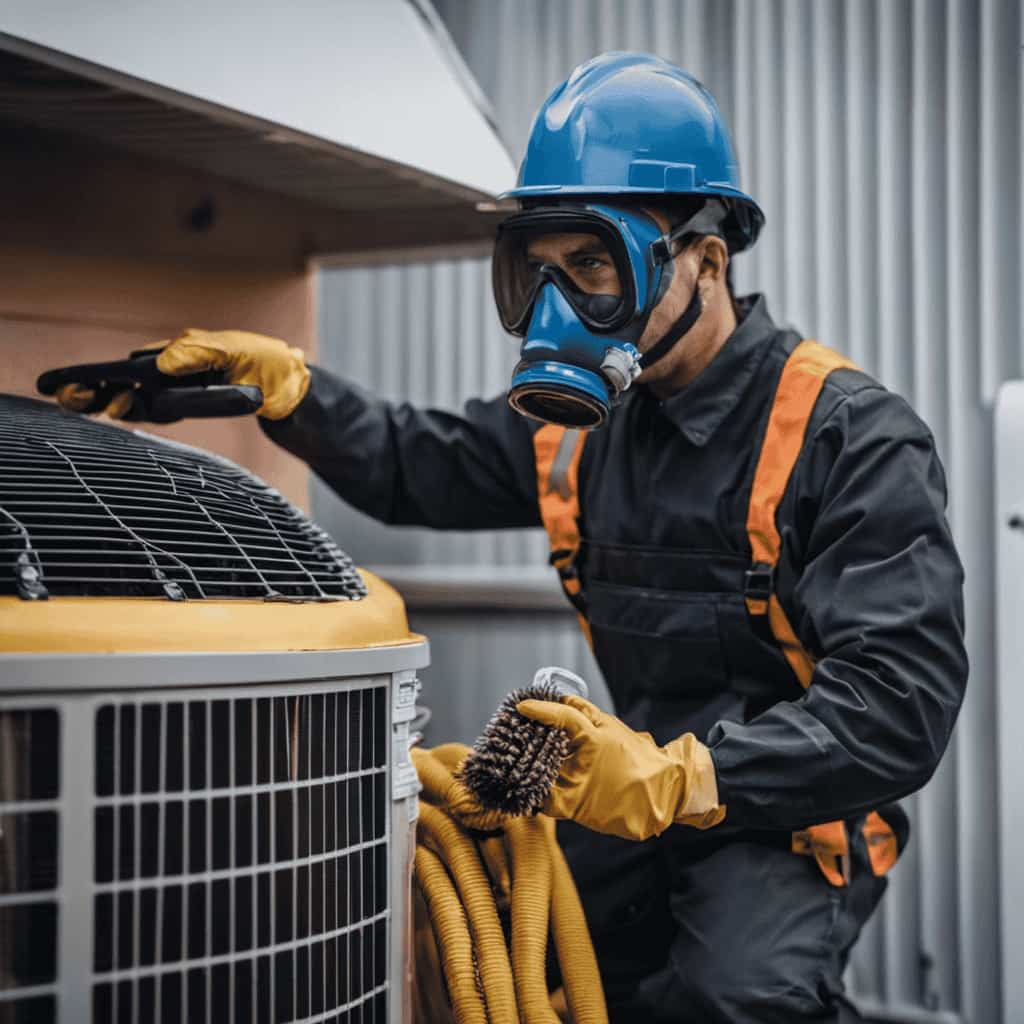
By optimizing heat exchanger design and making thermal conductivity improvements, we can minimize heat losses and maximize heat pump efficiency. This leads to reduced energy consumption and increased cost savings for the end-users.
To further enhance heat pump performance, it’s essential to address the importance of proper refrigerant charge, which will be discussed in the subsequent section.
Importance of Proper Refrigerant Charge in Maximizing Heat Pump Performance
When it comes to maximizing heat pump performance, the proper refrigerant charge plays a crucial role. Achieving an optimal refrigerant charge ensures that the system operates at its peak efficiency, resulting in better performance and energy savings.
Incorrect refrigerant charge can lead to decreased efficiency, reduced heating or cooling capacity, and potential damage to the system. Therefore, it’s important to carefully measure and adjust the refrigerant charge to ensure optimal heat pump performance.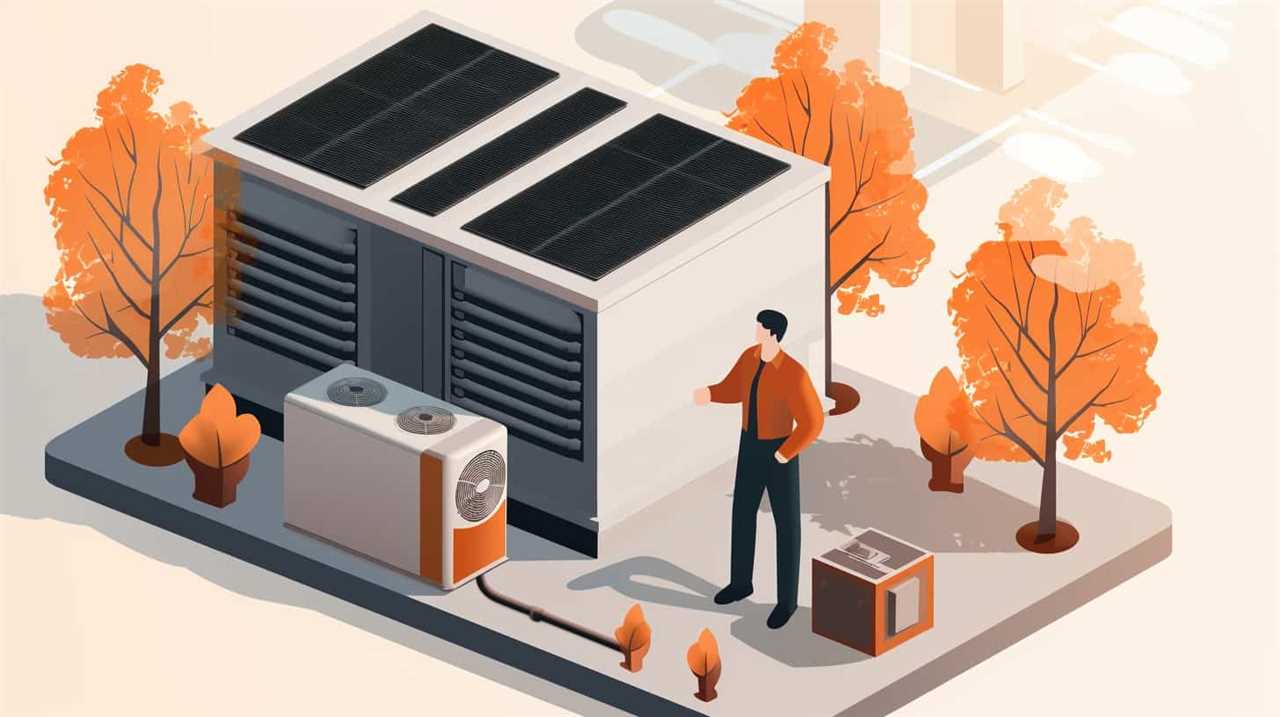
Optimal Refrigerant Charge
We can maximize heat pump performance by ensuring the proper refrigerant charge, which is crucial for optimal efficiency. The refrigerant charge refers to the amount of refrigerant contained within the heat pump system.
Here are five reasons why the optimal refrigerant charge is important:
Efficient heat transfer: The correct refrigerant charge ensures that the heat transfer process is efficient, allowing for effective heating and cooling.
Reduced energy consumption: A proper refrigerant charge minimizes energy wastage, leading to lower energy consumption and decreased utility bills.
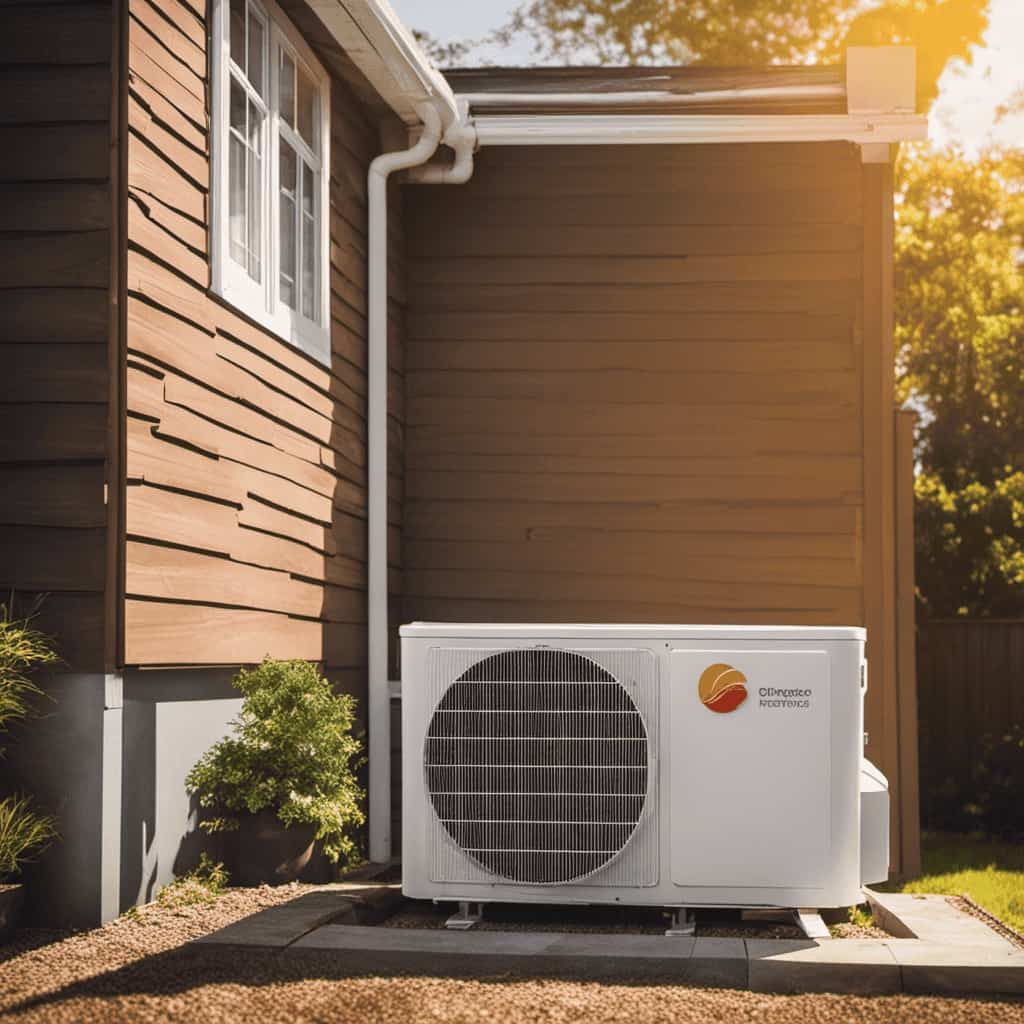
Extended equipment lifespan: The right refrigerant charge helps prevent overworking the heat pump, reducing wear and tear and extending the equipment’s lifespan.
Enhanced system performance: An optimal charge ensures the heat pump operates at its peak performance, providing consistent heating and cooling throughout the year.
Improved comfort: Proper refrigerant charge leads to improved comfort levels by maintaining the desired temperature and humidity levels in the indoor environment.
Performance and Efficiency
Proper refrigerant charge is crucial for maximizing heat pump performance and efficiency. The refrigerant charge refers to the amount of refrigerant present in the heat pump system. If the charge is too low, the heat pump will not be able to absorb and transfer heat effectively, resulting in decreased performance and increased energy consumption. On the other hand, if the charge is too high, it can lead to reduced heat transfer efficiency and compressor overload. Therefore, it is essential to ensure the refrigerant charge is within the manufacturer’s specified range to achieve optimal performance.
To emphasize the importance of proper refrigerant charge, let’s take a look at the following table:
| Refrigerant Charge | Performance Analysis | Energy Consumption |
|---|---|---|
| Low | Decreased | Increased |
| High | Reduced | Increased |
| Optimal | Maximized | Optimized |
As shown in the table, an optimal refrigerant charge leads to maximized heat pump performance and optimized energy consumption. Moving forward, let’s explore the next aspect of heat pump efficiency, which is enhancing heat transfer in the evaporator and condenser for improved efficiency.
Enhancing Heat Transfer in the Evaporator and Condenser for Improved Efficiency
Our goal is to enhance the heat transfer in the evaporator and condenser for improved efficiency. Achieving efficient heat transfer is crucial in optimizing the performance of heat pumps.
Here are some ways to enhance heat transfer in the evaporator and condenser: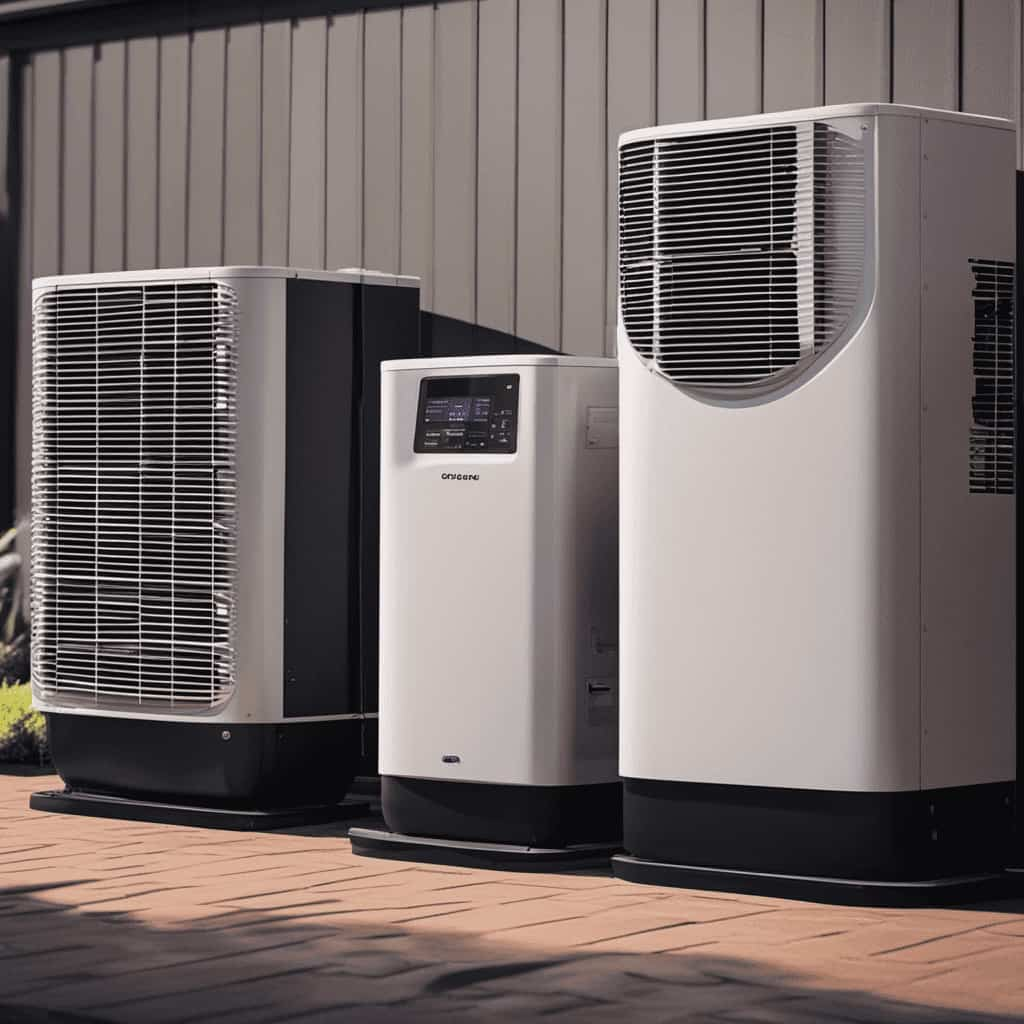
Evaporator design: Incorporating advanced evaporator designs such as microchannel technology can increase the surface area available for heat transfer, improving overall efficiency.
Condenser enhancements: Utilizing techniques like enhanced surface coatings or finned tubes in the condenser can enhance heat transfer by increasing the contact area between the refrigerant and the surroundings.
Optimized refrigerant flow: Implementing flow distribution devices within the evaporator and condenser can ensure uniform refrigerant distribution, maximizing heat transfer efficiency.
Improved insulation: Enhancing the insulation surrounding the evaporator and condenser minimizes heat loss, allowing for better heat transfer and improved efficiency.

Regular maintenance: Regularly cleaning and maintaining the evaporator and condenser coils can prevent the accumulation of dirt and debris, ensuring optimal heat transfer performance.
Strategies for Minimizing Pressure Drop in the Refrigeration Cycle of Heat Pumps
To optimize the refrigeration cycle of heat pumps, we can employ strategies for minimizing pressure drop throughout the system.
Minimizing pressure loss is crucial in improving the overall efficiency of the heat pump and ensuring a smooth flow of refrigerant.
One strategy is to carefully design the piping system to minimize resistance to flow. This can be achieved by using larger diameter pipes and reducing the number of bends and fittings.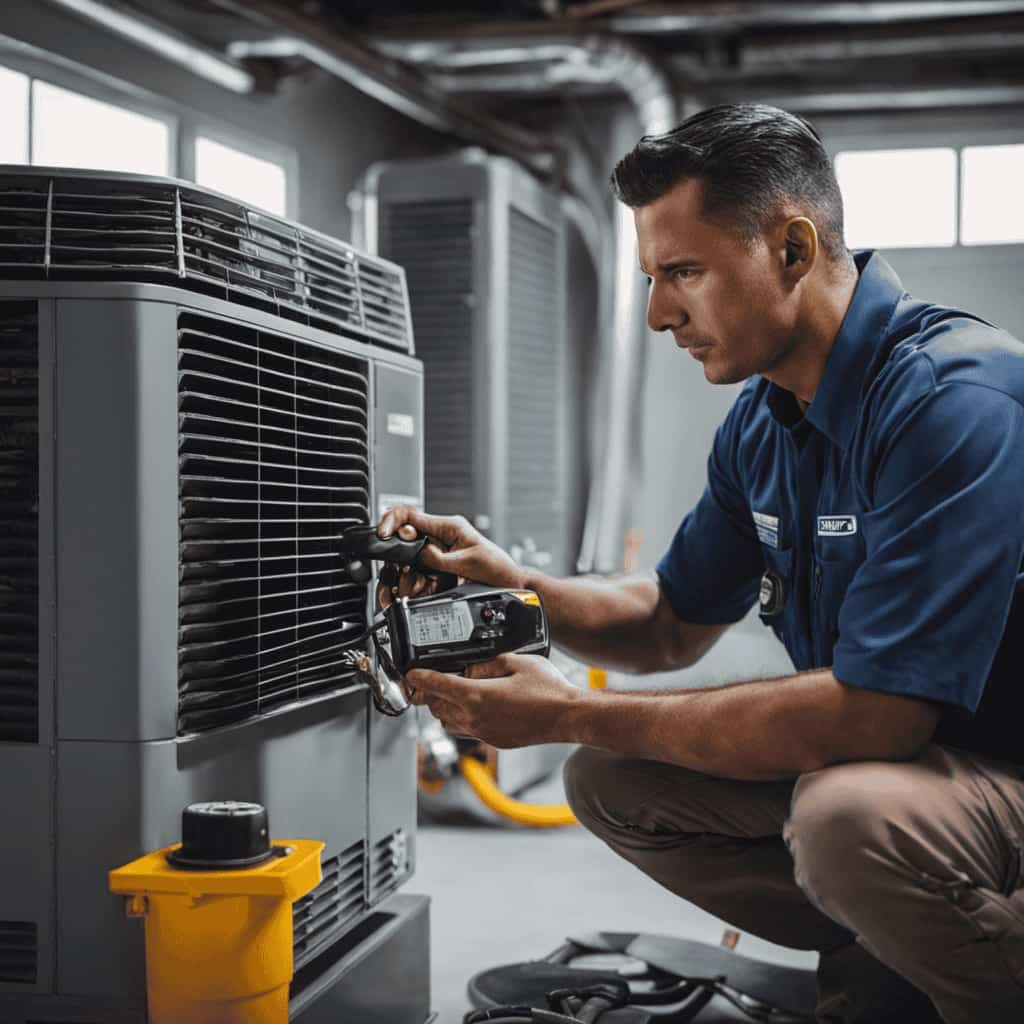
Additionally, choosing the right type of refrigerant can also help in improving flow dynamics and reducing pressure drop.
Another strategy is to ensure proper insulation of the pipes to prevent heat loss, as this can lead to a decrease in pressure.
Optimizing Superheat and Subcooling for Enhanced Heat Pump Efficiency
To achieve enhanced heat pump efficiency, we can optimize superheat and subcooling by adjusting the refrigeration cycle parameters. Superheat optimization refers to the process of ensuring that the refrigerant is completely vaporized before it reaches the compressor. This can be achieved by adjusting the temperature and pressure at the evaporator outlet.
Subcooling techniques involve cooling the refrigerant below its condensing temperature before it enters the expansion valve. This helps to improve the efficiency of the heat transfer process during the refrigeration cycle.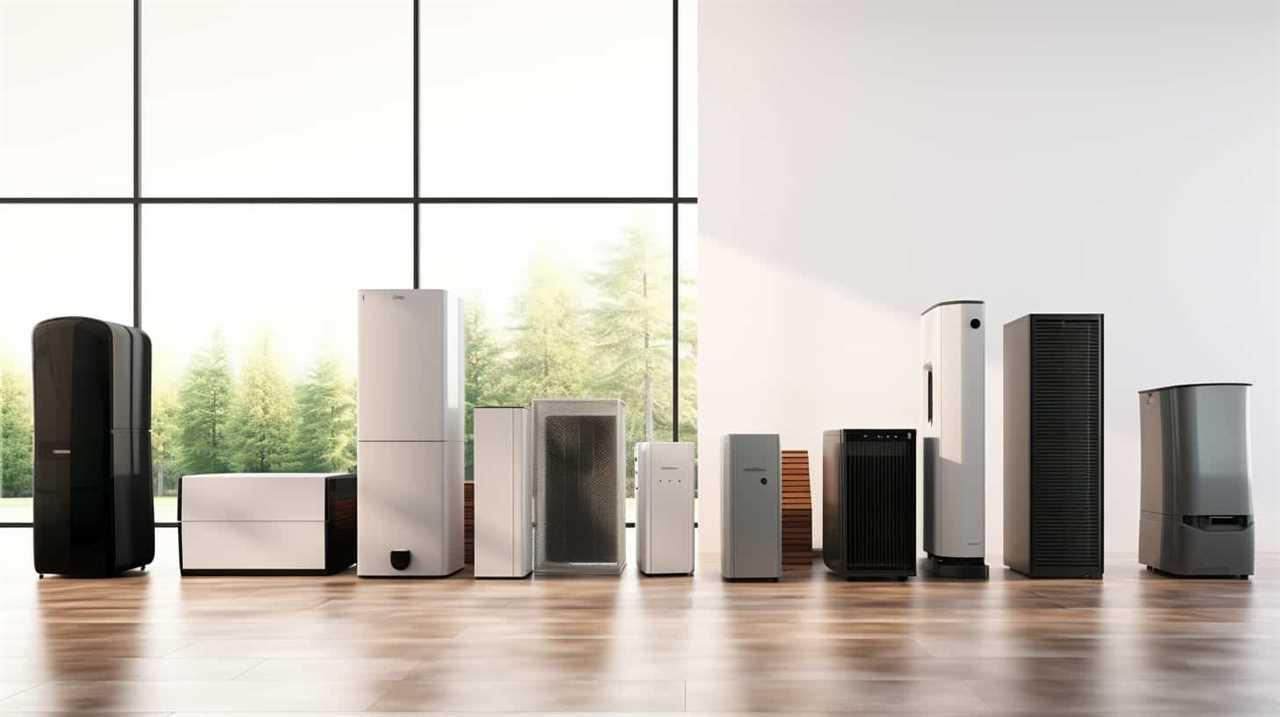
By optimizing superheat and subcooling, we can minimize energy losses and improve the overall performance of the heat pump. This not only increases efficiency but also reduces operating costs and extends the lifespan of the equipment.
With these optimization techniques in place, heat pumps can deliver optimal performance in providing heating and cooling solutions.
To ensure optimal refrigeration cycle performance in heat pumps, it’s important to implement regular maintenance and troubleshooting practices.
Maintenance and Troubleshooting Tips to Ensure Optimal Refrigeration Cycle Performance in Heat Pumps
Regular maintenance and troubleshooting practices are essential for ensuring optimal refrigeration cycle performance in heat pumps. By following proper maintenance practices, heat pump owners can prevent potential issues and prolong the lifespan of their equipment.

One important maintenance task is regularly cleaning or replacing air filters to ensure proper airflow, which is crucial for efficient heat transfer. Additionally, inspecting and cleaning the condenser and evaporator coils can help maintain their efficiency.
Troubleshooting techniques can also be employed to identify and resolve any performance issues. This may involve checking for refrigerant leaks, inspecting electrical connections, and calibrating thermostats. It’s important to address any issues promptly to prevent further damage and maintain optimal system performance.
Regular maintenance and troubleshooting not only improve heat pump efficiency but also contribute to energy savings and overall customer satisfaction.
Frequently Asked Questions
Can Heat Pumps Be Used in Both Residential and Commercial Settings?
Heat pumps can be used in both residential and commercial settings. They offer advantages such as energy efficiency and cost savings. However, there may be disadvantages such as higher upfront costs and limited performance in extreme climates.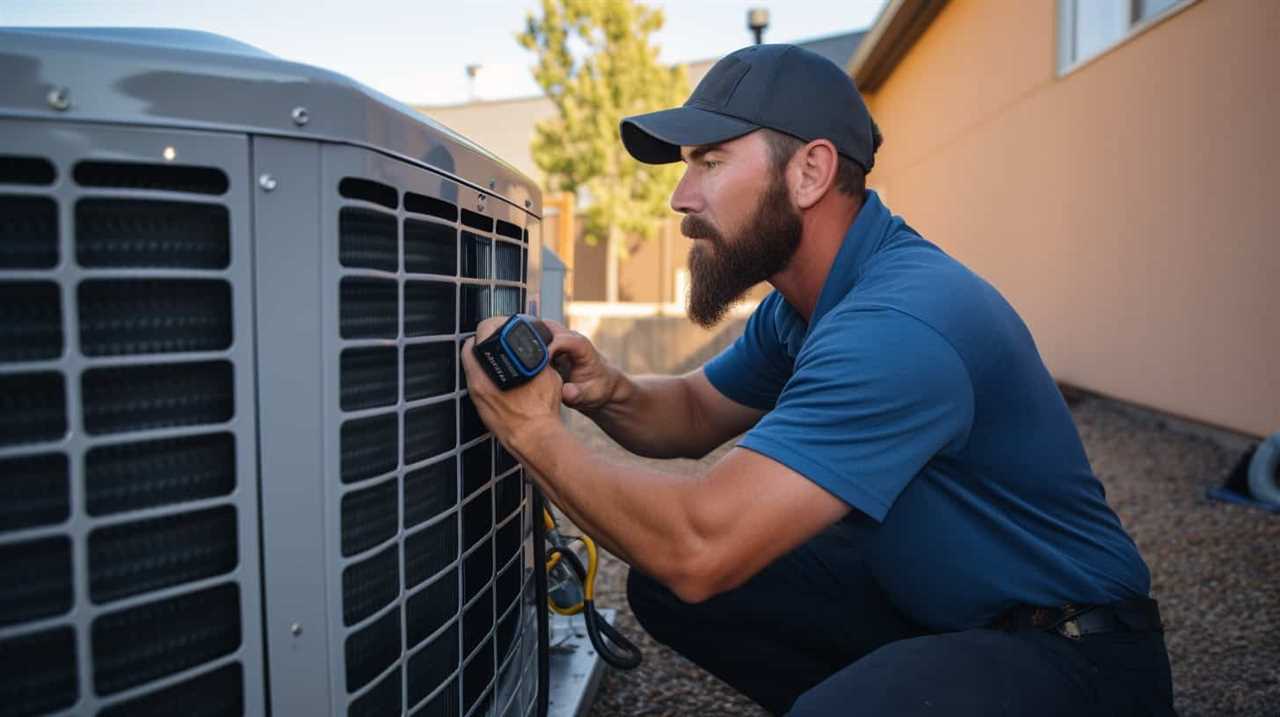
How Does the Refrigeration Cycle in Heat Pumps Differ From Traditional Air Conditioning Systems?
The refrigeration cycle in heat pumps differs from traditional air conditioning systems by its higher efficiency and the advantages it offers over air conditioning systems.
Are There Any Government Incentives or Rebates Available for Installing a Heat Pump System?
Yes, there are government incentives and rebates available for installing a heat pump system. These incentives aim to promote energy savings and provide financial assistance to those who choose to adopt more efficient heating and cooling solutions.
What Is the Typical Lifespan of a Heat Pump System?
The typical lifespan of a heat pump system depends on various factors, including regular heat pump maintenance and early detection of signs of heat pump failure.
Can Heat Pumps Be Used in Colder Climates, or Are They Only Effective in Mild or Warm Climates?
In colder climates, heat pumps can be used effectively, although their performance may be compared to traditional heating systems. Factors such as outdoor temperature, insulation, and system size can affect the efficiency of heat pumps in colder climates.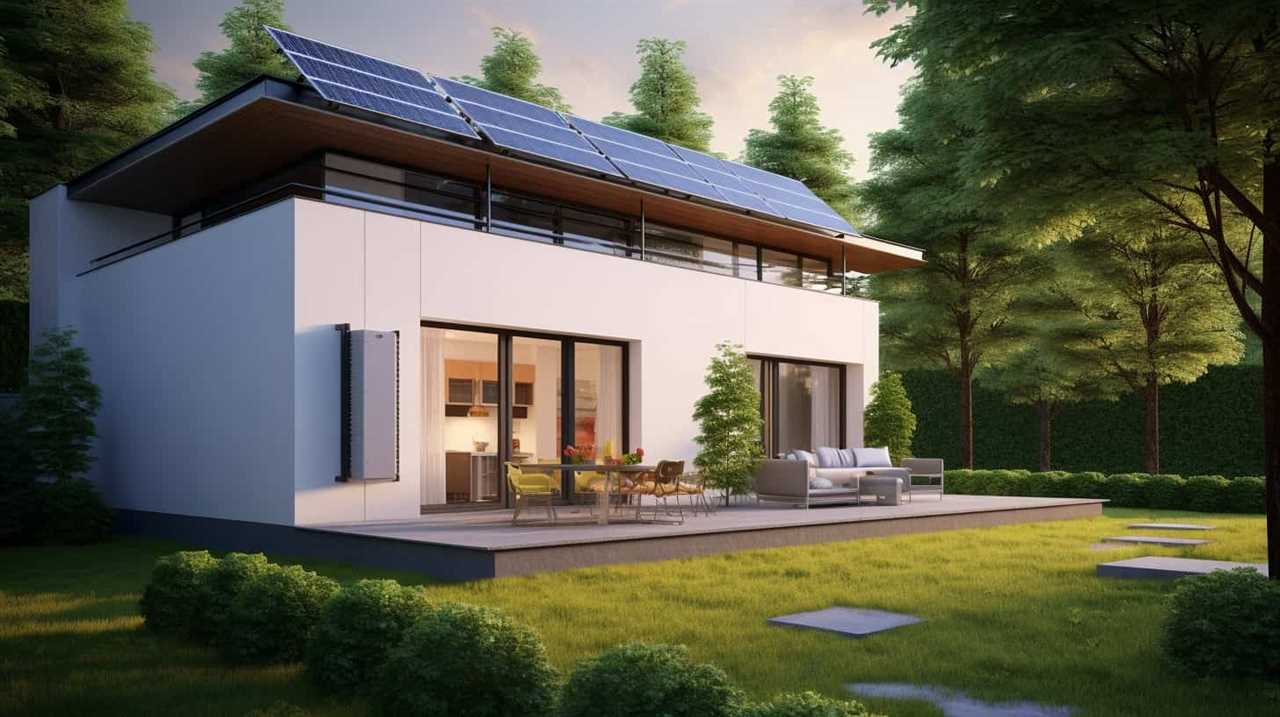
What Are Some Ways to Optimize the Refrigeration Cycle in Heat Pumps to Boost Efficiency?
When it comes to heat pump efficiency optimization, there are several ways to boost the overall performance of the refrigeration cycle. One method is to ensure regular maintenance of the heat pump system, including cleaning and replacing filters. Additionally, proper insulation and sealing of ducts can prevent energy loss. Choosing an appropriately sized heat pump and utilizing programmable thermostats can also enhance efficiency. Lastly, regularly monitoring and adjusting refrigerant levels and ensuring proper airflow will further optimize the refrigeration cycle in heat pumps for increased efficiency.
Conclusion
In conclusion, optimizing the refrigeration cycle in heat pumps is essential for maximizing efficiency. By understanding the basics of the cycle and ensuring proper refrigerant charge, heat pump performance can be significantly improved.
Enhancing heat transfer in the evaporator and condenser, minimizing pressure drop, and optimizing superheat and subcooling are all strategies that can enhance efficiency.
By implementing these measures, heat pump systems can achieve impressive energy savings of up to 30%, making them a highly efficient and cost-effective solution for heating and cooling needs.
Installation and Maintenance of Heat Pumps
Why Choose Professional Heat Pump Installation Services

When it comes to installing a heat pump, everyone wants a smooth process and long-lasting results. That’s why choosing professional installation services is a smart choice.
With their expertise and experience, they ensure proper and efficient installation, using the necessary tools and equipment. This saves you time and money in the long run.
Plus, you’ll have the peace of mind knowing that you have warranty and support for any future needs. Let the professionals take care of your heat pump installation needs.
Key Takeaways
- Accurate sizing based on home’s heating and cooling needs
- Proper placement to maximize performance and minimize noise and vibration
- Access to necessary tools and equipment for a smooth and efficient installation process
- Warranty and support provided for peace of mind and assistance with any future needs or inquiries.
Expertise and Experience
We have over 10 years of expertise and experience in providing professional heat pump installation services. Our team of technicians undergoes rigorous training and certification programs to ensure that they’re equipped with the knowledge and skills necessary to handle any installation project.
We understand the importance of customer satisfaction, which is why we prioritize delivering high-quality service every time. Our extensive experience in the industry has allowed us to refine our installation processes, ensuring efficiency and precision in every job we undertake.
We take pride in our ability to meet the unique needs of each customer, offering personalized solutions tailored to their specific requirements. With our expertise and experience, you can trust us to provide reliable and professional heat pump installation services that exceed your expectations.
Proper and Efficient Installation
With our team of experienced technicians, we ensure proper and efficient installation of heat pump systems. When it comes to heat pump installation, there are common mistakes that inexperienced individuals may make, which can lead to inefficiencies and costly repairs down the line. By choosing professional installation services, you can avoid these pitfalls and enjoy the following benefits:
- Accurate sizing: Our technicians will carefully assess your home’s heating and cooling needs to determine the right size of heat pump for optimal efficiency.
- Proper placement: We understand the importance of placing the heat pump in the right location to maximize its performance and minimize noise and vibration.
- Correct wiring and connections: Our experts will ensure that all electrical connections are properly installed, reducing the risk of malfunctions or electrical hazards.
- Thorough testing and inspections: We conduct thorough testing and inspections to verify that your heat pump system is functioning at its best, ensuring your comfort and peace of mind.
By entrusting your heat pump installation to our professionals, you can avoid common mistakes and experience the full benefits of a properly installed system.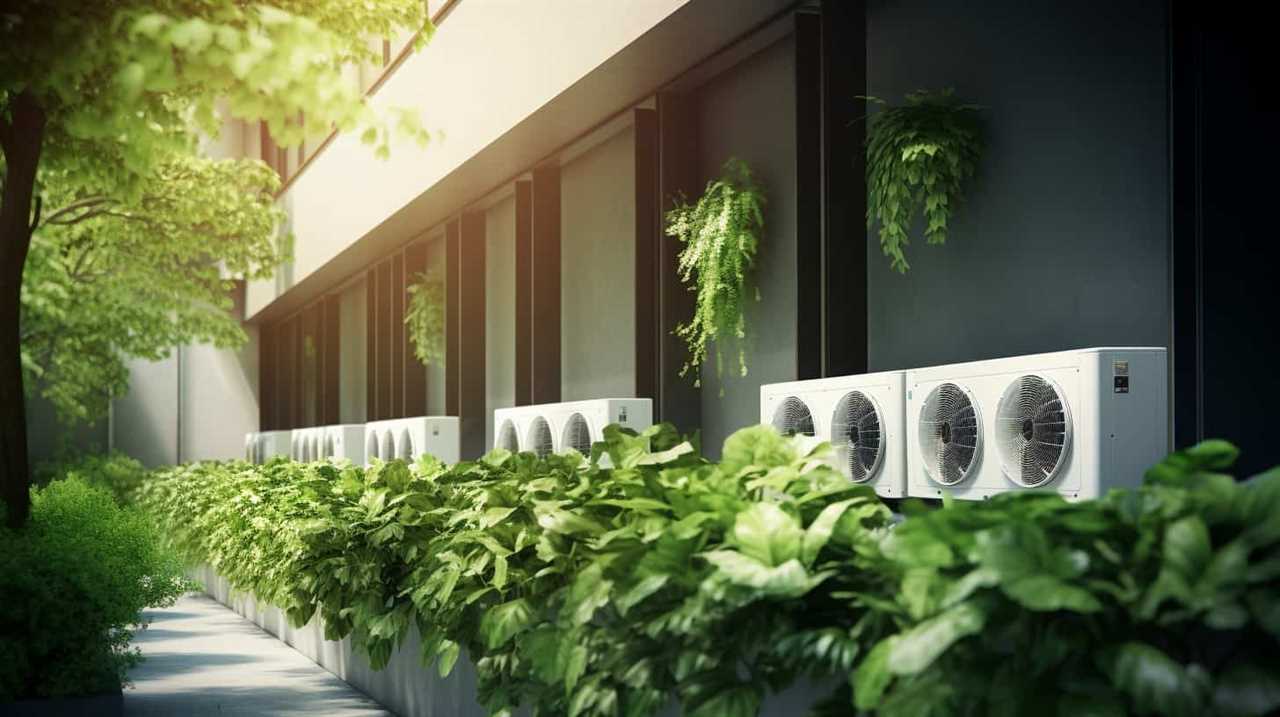
Now, let’s move on to discuss the next topic: access to necessary tools and equipment.
Access to Necessary Tools and Equipment
Having the right tools and equipment is essential for ensuring a smooth and efficient heat pump installation process. When you choose professional heat pump installation services, you benefit from their access to specialized machinery and equipment. These professionals are trained and certified to handle the installation process with precision and expertise.
They have the necessary tools, such as manifold gauges, vacuum pumps, and refrigerant scales, which are crucial for properly installing a heat pump. Additionally, they are equipped with safety gear and follow industry guidelines to ensure a safe installation.
Time and Cost Savings
By opting for professional heat pump installation services, you can save both time and money. Here are some reasons why:
Expertise: Professional installers have the necessary knowledge and experience to install heat pumps efficiently and correctly, saving you time and potential headaches.
Proper Installation: Improper installation can lead to reduced energy efficiency and increased costs in the long run. Professionals ensure that the heat pump is installed correctly, maximizing its energy efficiency and providing long-term benefits.
Time Savings: Professional installers have the skills and tools to complete the installation quickly and efficiently. This means you can start enjoying the benefits of your heat pump sooner.
Cost Efficiency: While hiring professionals may have upfront costs, their expertise can help you avoid costly mistakes and ensure that your heat pump operates at its optimal level, saving you money on energy bills and potential repairs.
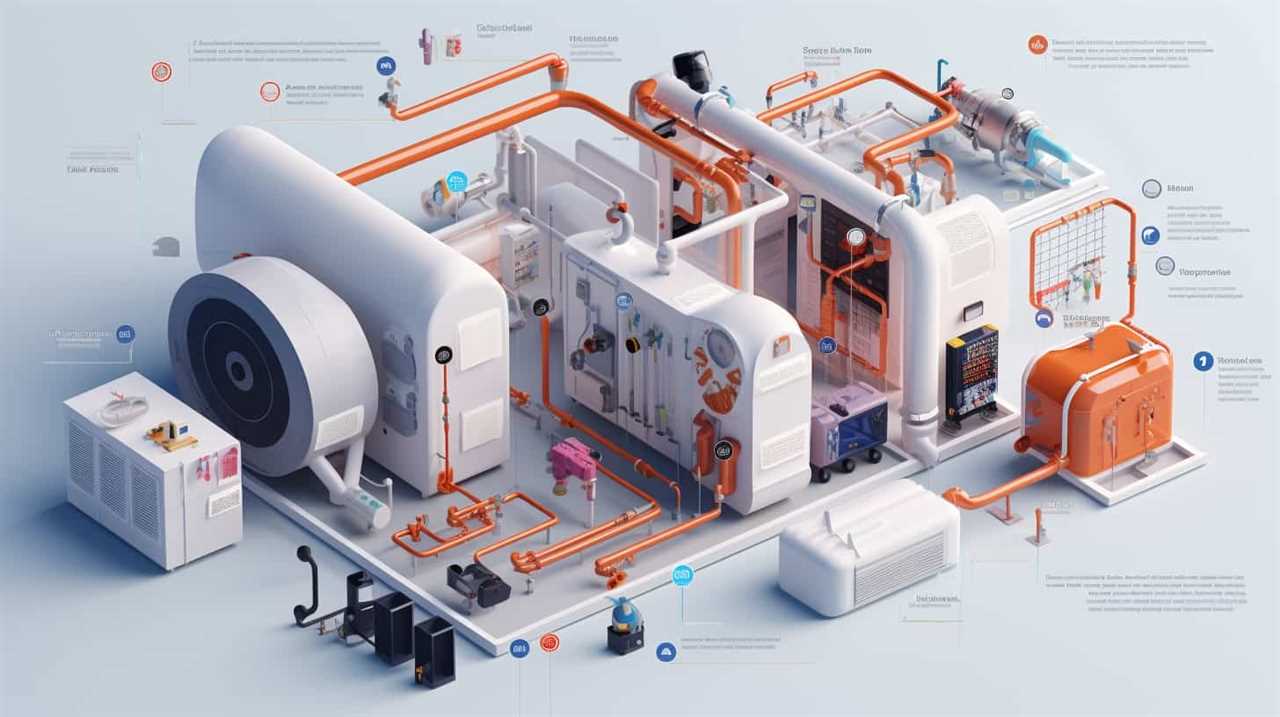
Choosing professional heat pump installation services not only saves you time but also provides long-term benefits in terms of energy efficiency and cost savings.
Warranty and Support
We can benefit from a warranty and receive support when we choose professional heat pump installation services. These services provide customers with a sense of security and assurance, ensuring that any issues or concerns that arise during the installation process or afterwards can be addressed promptly and effectively. The warranty guarantees that any necessary repairs or replacements will be covered, minimizing additional costs for the customer. Additionally, professional installation services often come with dedicated customer support, available to assist with any questions or problems that may arise. This level of support ensures customer satisfaction and peace of mind, knowing that help is just a phone call away. By opting for professional heat pump installation services, customers can enjoy long term benefits, knowing that their investment is protected and supported.
| Warranty and Support | ||
|---|---|---|
| Customer Security | Prompt Assistance | Long Term Support |
| Minimizes Costs | Dedicated Support | Peace of Mind |
| Ensures Satisfaction |
Frequently Asked Questions
How Long Does the Heat Pump Installation Process Typically Take?
Typically, the heat pump installation process takes several hours to complete. However, it’s important to note that the duration may vary depending on factors such as the size of the system and the complexity of the installation.
Can I Install a Heat Pump Myself or Is Professional Installation Necessary?
Installing a heat pump yourself may seem tempting, but professional installation is necessary for optimal performance and safety. The benefits of professional installation include expertise, proper sizing, and warranty coverage.
What Type of Maintenance Does a Heat Pump Require After Installation?
Heat pump maintenance is crucial to ensure optimal performance. Regularly cleaning or replacing filters, checking refrigerant levels, and inspecting for common issues like leaks or faulty components are key.
Are There Any Specific Requirements or Considerations for the Location of the Heat Pump Installation?
Location requirements and installation considerations for a heat pump include proper sizing, adequate clearance for airflow, and proximity to a power source. Professional installation services ensure these requirements are met, ensuring optimal performance and longevity of the heat pump.
What Steps Should I Take to Ensure the Heat Pump Operates Efficiently and Effectively?
To maximize heat pump performance, we need to take certain steps. Avoid common installation mistakes such as improper sizing or inadequate insulation. Ensuring efficiency and effectiveness requires proper installation, maintenance, and regular servicing.
What Are the Costs Involved in Professional Heat Pump Installation and Maintenance?
Installing and maintaining a heat pump costs can vary depending on various factors. The initial installation costs include purchasing the heat pump and hiring a professional for installation. Additional expenses may arise from any necessary modifications to the existing HVAC system. Ongoing maintenance costs include regular inspections, filter replacements, and possible repairs. It is advisable to consult with professionals to get accurate estimates tailored to your specific needs.
Conclusion
In conclusion, opting for professional heat pump installation services is a wise decision. With their expertise and experience, they ensure a proper and efficient installation, using the necessary tools and equipment. This saves both time and cost, providing peace of mind to homeowners.

Similar to a well-oiled machine, a professionally installed heat pump operates smoothly and seamlessly, maximizing its performance and longevity. So, choose the professionals and enjoy the benefits of a well-functioning heat pump system.
Installation and Maintenance of Heat Pumps
Unlocking the Secrets of Heat Pump Refrigeration Mechanics

Are you ready to explore how heat pump refrigeration works? Get prepared, as we are about to delve into a fascinating journey of the complex mechanisms behind these intelligent devices.
In this article, we’ll delve into the basics of the refrigeration cycle. We’ll explain how heat pumps use this cycle to transfer heat from one place to another, allowing them to both cool and heat spaces. Understanding the refrigeration cycle is essential for comprehending the mechanics of heat pump operation.
Next, we’ll explore the crucial roles of the compressor, condenser, evaporator, expansion valve, and reversing valve. Each of these components plays a vital part in the refrigeration process. We’ll explain how they work together to ensure efficient heat transfer and temperature regulation.
Additionally, we’ll discuss the impact of different refrigerant types on heat pump performance. The choice of refrigerant can significantly affect the system’s efficiency, environmental impact, and overall effectiveness. We’ll provide an overview of commonly used refrigerants and their pros and cons.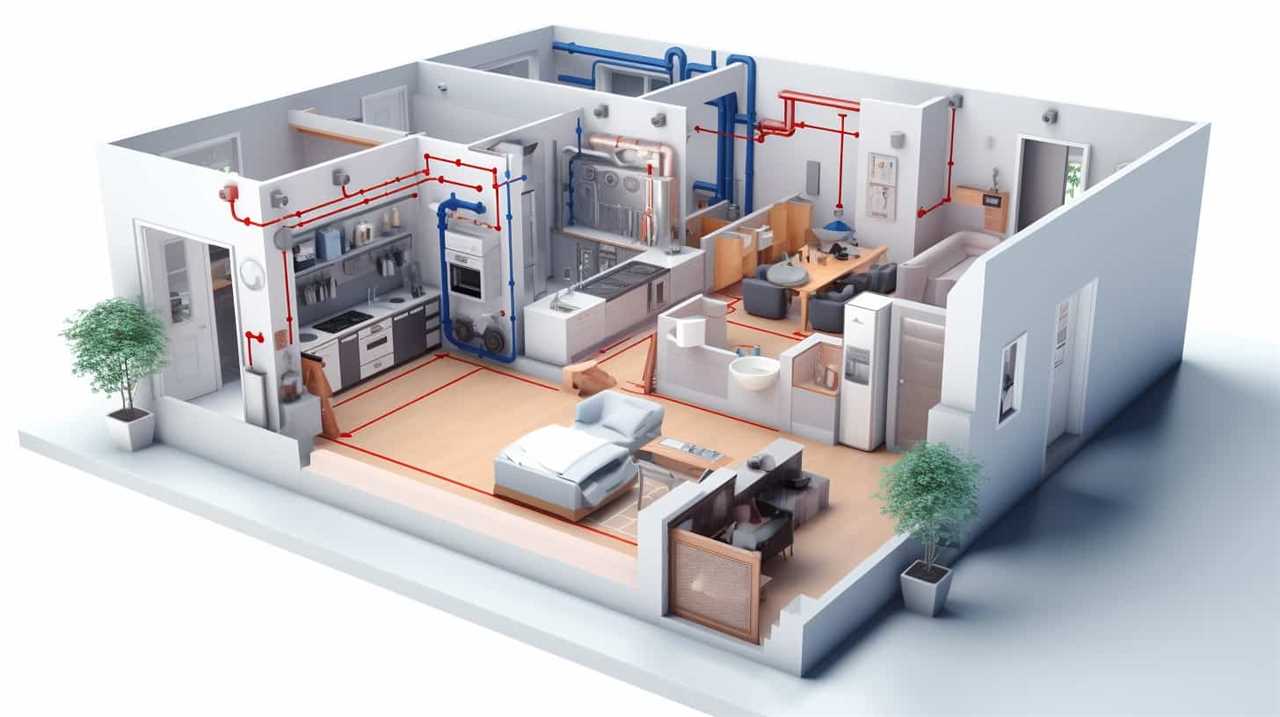
Finally, we’ll troubleshoot common issues that heat pump owners may encounter. From inadequate heating or cooling to unusual noises or leaks, we’ll guide you through diagnosing and resolving these problems. Proper maintenance and timely repairs are crucial for keeping your heat pump running smoothly.
So, if you’re ready to embark on this educational journey, let’s get started! By the end of this article, you’ll have a deeper understanding of heat pump refrigeration mechanics and be better equipped to ensure optimal performance from your system.
Key Takeaways
- The refrigeration cycle is the fundamental process behind heat pump operation.
- Efficient compressor operation is vital for optimal heat pump performance.
- Proper insulation reduces heat loss and improves energy efficiency.
- Factors to consider when selecting a refrigerant include efficiency, environmental impact, and safety.
The Basics of Heat Pump Refrigeration Cycle
Now let’s dive into the basics of the heat pump refrigeration cycle.
In order to understand how a heat pump works, it’s important to grasp the concept of the refrigeration cycle. The heat pump operates by transferring heat from one location to another using a refrigerant. This refrigerant is a substance that’s capable of absorbing and releasing heat as it changes from a liquid to a gas and back to a liquid again.
The refrigerant flow control is a critical component of the heat pump system. It regulates the flow of refrigerant through the system, ensuring that the right amount is circulated to achieve optimal heating or cooling. Proper refrigerant flow control is essential for the heat pump to operate efficiently and effectively, allowing it to provide comfort and serve the needs of its users.
Understanding the Role of the Compressor
Now let’s explore the inner workings of the compressor in a heat pump refrigeration system.
The compressor plays a crucial role in the cycle by increasing the pressure and temperature of the refrigerant. It accomplishes this by compressing the low-pressure gas, causing it to become a high-pressure gas.
Understanding how the compressor operates, ensuring its efficiency, and following proper maintenance tips are essential for optimal heat pump performance and energy efficiency.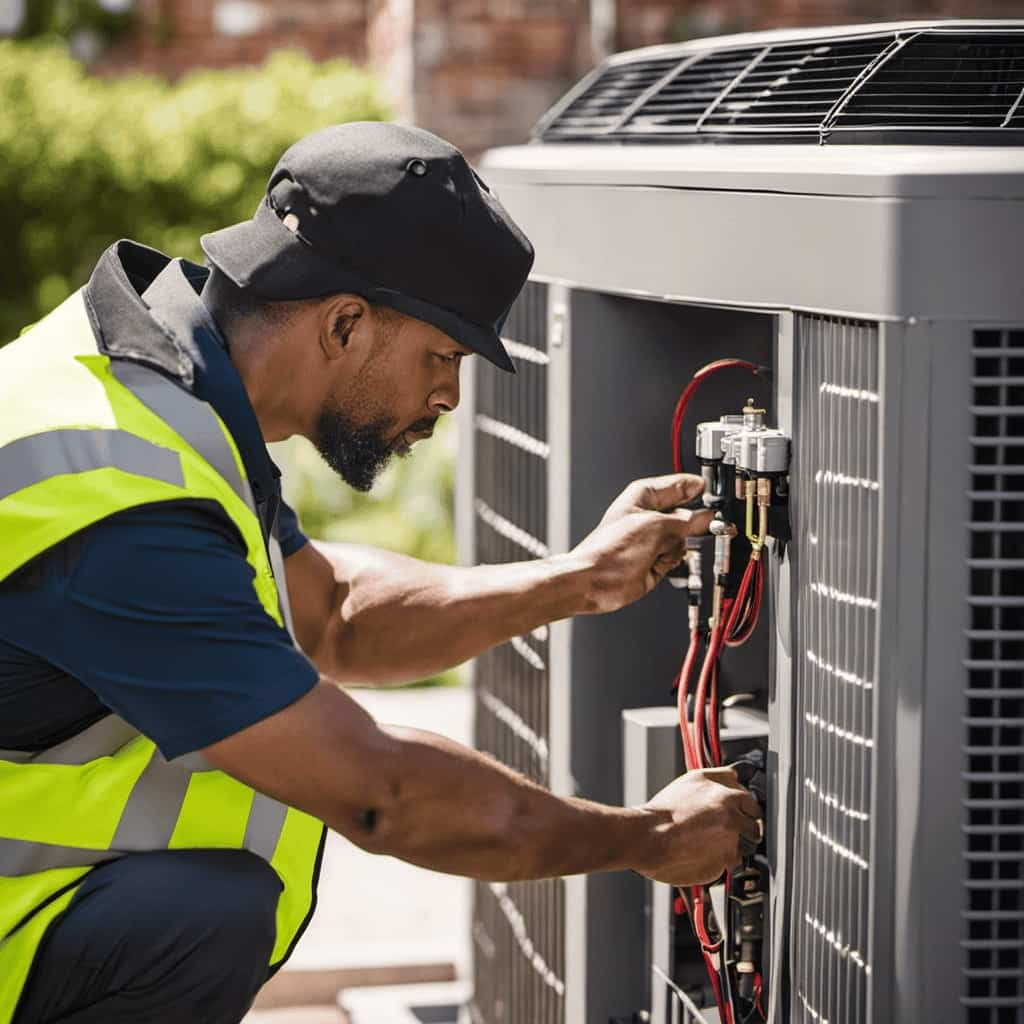
Compressor Operation Explained
Our understanding of compressor operation is crucial in comprehending the role it plays in heat pump refrigeration mechanics. The compressor is the heart of the heat pump system, responsible for circulating refrigerant and ensuring efficient heat transfer.
To help you better understand compressor operation, here are four key points to consider:
Compressor Troubleshooting: Understanding common compressor issues such as motor failure, refrigerant leaks, or inadequate lubrication can help diagnose and resolve problems effectively.
Compressor Design: Different heat pump applications require specific compressor designs, considering factors like capacity, efficiency, and noise levels. Choosing the right compressor design ensures optimal performance and longevity.
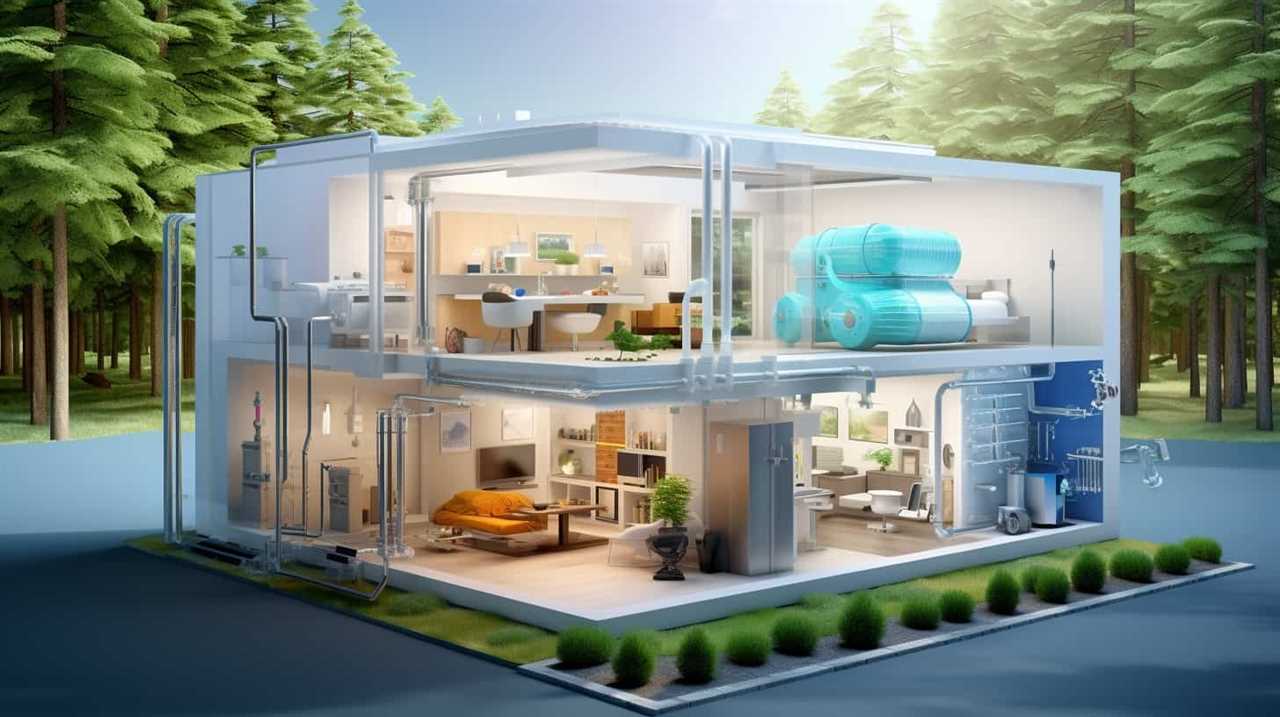
Compression Process: The compressor works by increasing the pressure and temperature of the refrigerant, preparing it for heat exchange in the condenser.
Energy Consumption: The compressor consumes the most energy in a heat pump system. Therefore, ensuring its efficiency is crucial for reducing energy consumption and operating costs.
Importance of Compressor Efficiency
Understanding compressor efficiency and its role in heat pump refrigeration mechanics is crucial for optimizing performance and reducing energy consumption. The compressor is the heart of a heat pump system, responsible for compressing the refrigerant and increasing its temperature and pressure. By improving the efficiency of the compressor, several benefits can be achieved. Firstly, it allows for better heat transfer between the refrigerant and the surroundings, resulting in improved heating or cooling performance. Secondly, it reduces the energy consumption of the heat pump, leading to lower operating costs and a smaller environmental footprint. Lastly, it increases the lifespan of the system by reducing wear and tear on the components. To illustrate the significance of compressor efficiency, the following table compares the energy consumption and performance of a heat pump with different compressor efficiency levels:
| Compressor Efficiency (%) | Energy Consumption (kWh) | Performance |
|---|---|---|
| 80 | 1000 | Good |
| 90 | 900 | Better |
| 95 | 850 | Best |
As shown in the table, improving compressor efficiency can significantly reduce energy consumption while enhancing the overall performance of the heat pump refrigeration system.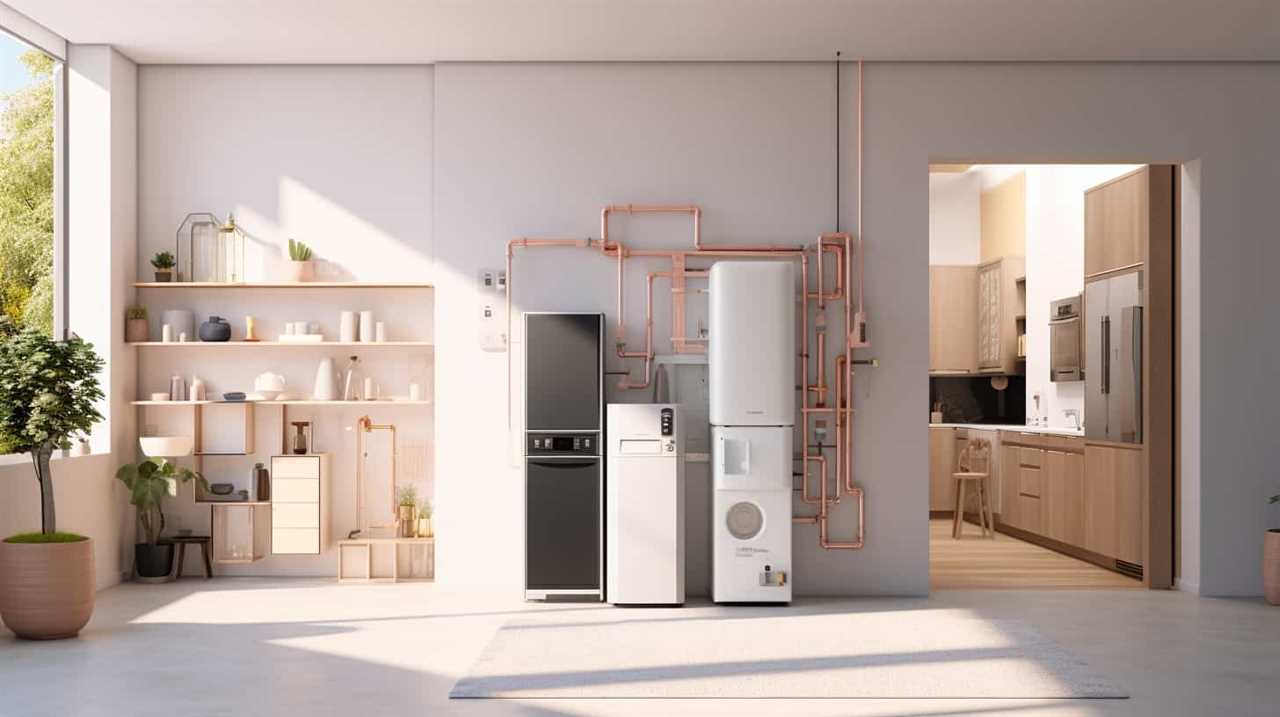
Compressor Maintenance Tips
We recommend regularly cleaning and lubricating the compressor, as well as checking for any signs of damage or wear, in order to maintain its optimal performance. Compressor troubleshooting and maintenance techniques are crucial for ensuring the efficient operation of heat pump refrigeration systems.
Here are four important tips to help you maintain your compressor:
Clean the compressor regularly: Remove any dirt, dust, or debris that may have accumulated on the compressor. This will help prevent clogging and ensure proper airflow.
Lubricate the compressor: Apply lubricating oil to the moving parts of the compressor to reduce friction and ensure smooth operation. Be sure to use the manufacturer-recommended lubricant.

Check for signs of damage or wear: Inspect the compressor for any signs of leaks, cracks, or worn-out parts. Addressing these issues promptly can prevent further damage and costly repairs.
Monitor compressor performance: Keep an eye on the compressor’s operating parameters, such as discharge pressure and temperature. Any abnormal readings may indicate a potential problem that requires attention.
The Significance of the Condenser in Heat Pump Operation
The condenser plays a crucial role in the operation of a heat pump. Its significance lies in its ability to facilitate the heat exchange process and ensure the efficiency of the entire system.
As the high-pressure refrigerant vapor enters the condenser, it comes into contact with the cooler ambient air or water. This contact causes the vapor to release heat energy, which is then transferred to the surrounding medium.
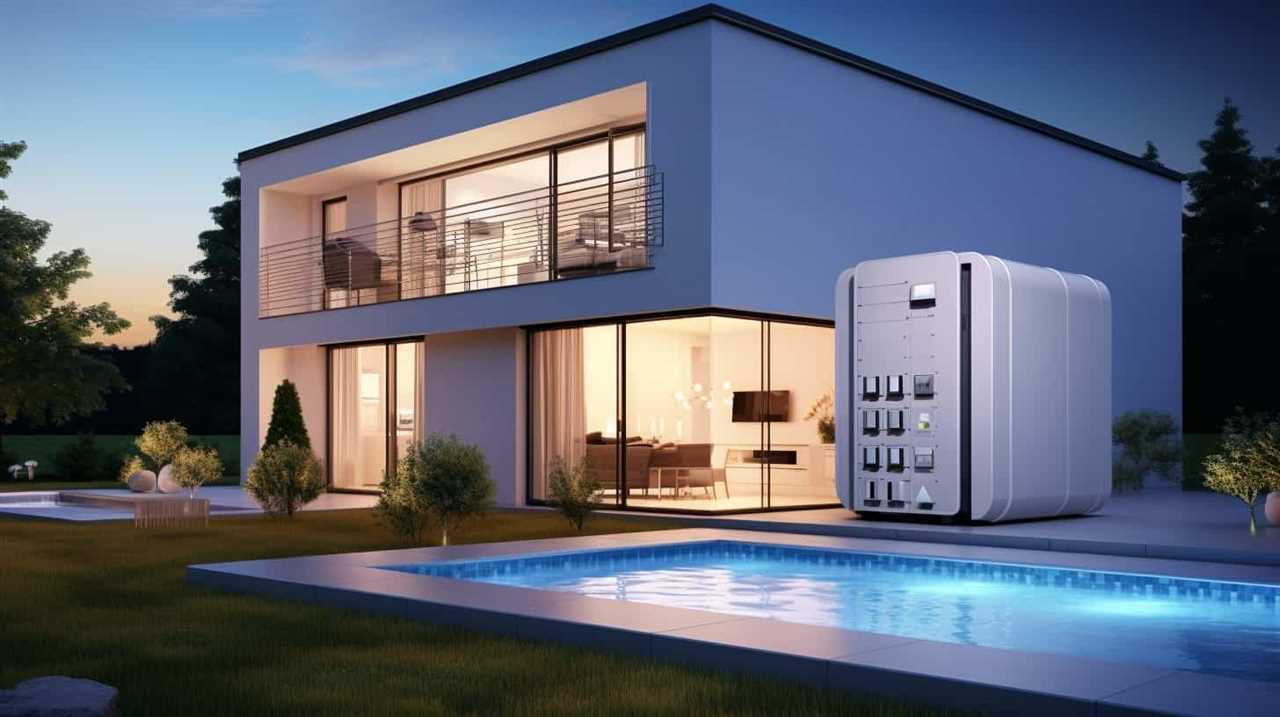
The condenser’s efficiency is vital in maximizing the heat transfer rate, as it directly affects the overall performance of the heat pump. By optimizing the design and construction of the condenser, heat pump technicians can improve its ability to transfer heat and enhance the system’s efficiency.
Now, let’s explore the evaporator’s function in the refrigeration cycle.
Exploring the Evaporator’s Function in the Refrigeration Cycle
In the evaporator, we extract heat from the surrounding environment to facilitate the refrigeration cycle. The evaporator plays a crucial role in the heat pump system, and its efficiency is vital for optimal performance. Here are four important factors to consider when it comes to evaporator design and efficiency:
Surface Area: Maximizing the surface area of the evaporator increases its ability to absorb heat from the environment. This can be achieved through the use of fins or by increasing the length of the coil.
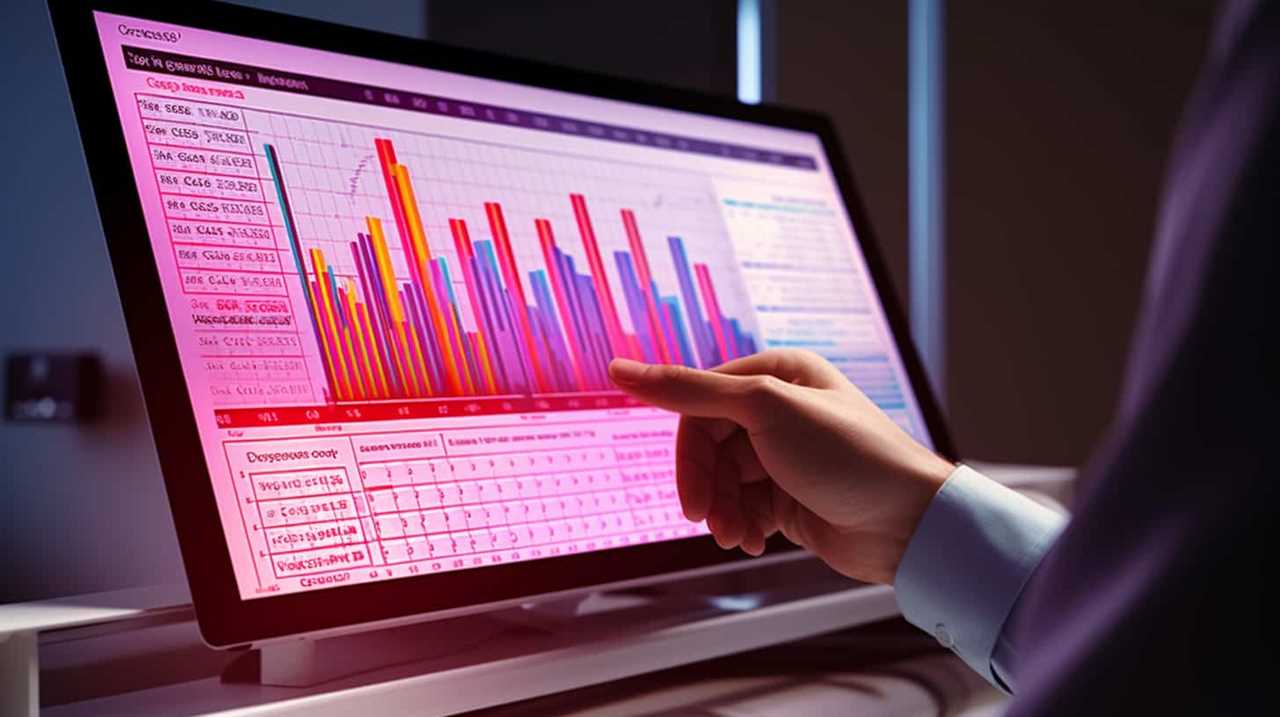
Refrigerant Flow: Properly designed evaporators ensure a uniform flow of refrigerant, allowing for efficient heat transfer. This can be achieved by using specialized tubes or channels within the evaporator.
Temperature Difference: Maintaining a significant temperature difference between the evaporator and the surrounding environment enhances heat transfer and improves the evaporator’s efficiency.
Frost Prevention: Frost formation on the evaporator coils reduces heat transfer efficiency. Implementing defrost mechanisms or designing evaporators with anti-frost coatings can prevent this issue.
Understanding the intricacies of evaporator efficiency and design is essential for optimizing heat pump performance.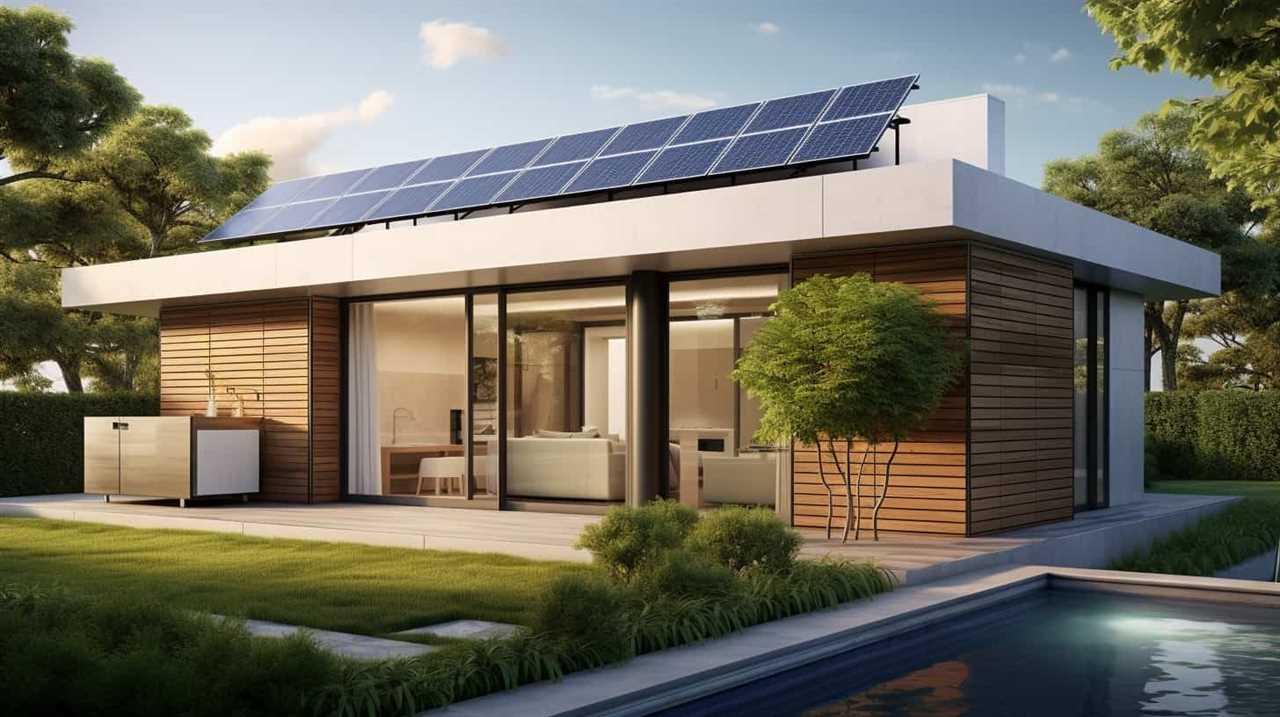
Now, let’s delve into how the expansion valve controls the flow of refrigerant.
How the Expansion Valve Controls the Flow of Refrigerant
The expansion valve plays a critical role in regulating the flow of refrigerant within the heat pump refrigeration system. By controlling the amount of refrigerant entering the evaporator, the expansion valve ensures optimal heat transfer efficiency.
It achieves this by maintaining a precise pressure drop across the valve, allowing the high-pressure liquid refrigerant to expand and vaporize, absorbing heat from the surroundings.
Expansion Valve Function
How does the expansion valve control the flow of refrigerant in a heat pump?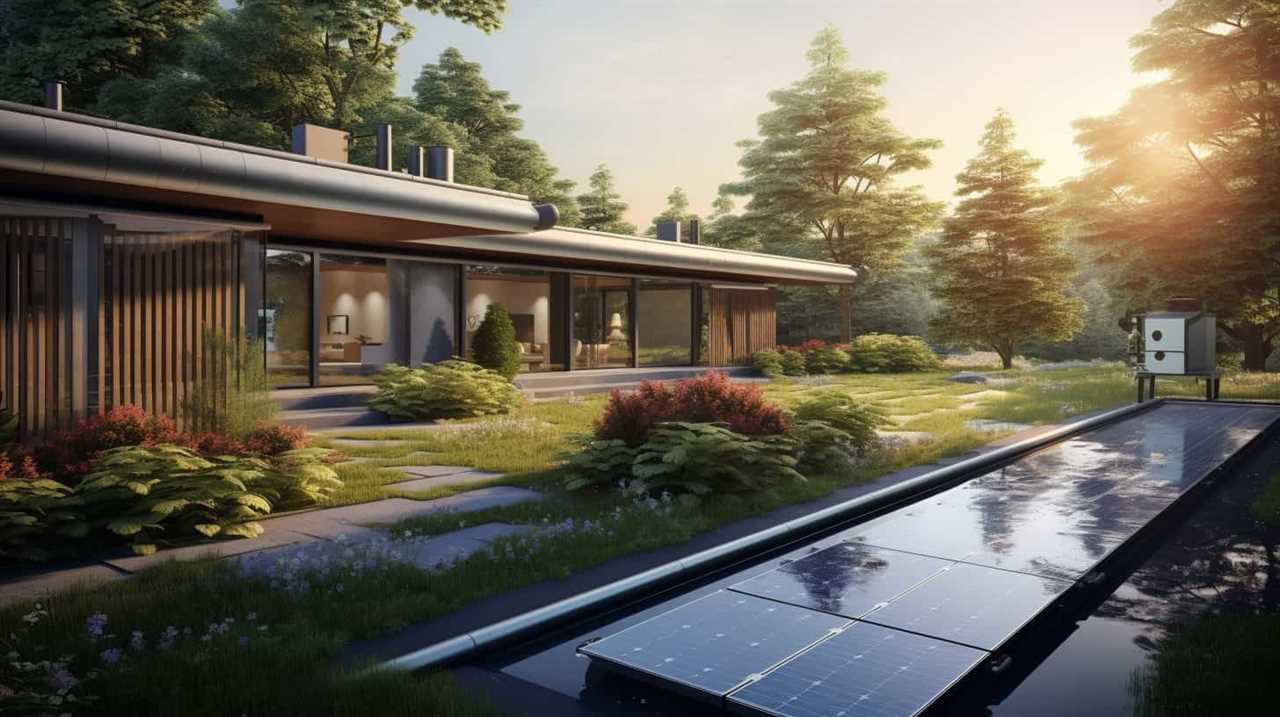
The expansion valve plays a crucial role in regulating the flow of refrigerant within a heat pump system. Here are four key functions of the expansion valve:
Metering: The expansion valve acts as a metering device, precisely controlling the flow rate of the refrigerant into the evaporator coil.
Pressure regulation: By reducing the pressure of the refrigerant, the expansion valve enables it to undergo a phase change from high-pressure liquid to low-pressure vapor.
Temperature control: The expansion valve helps maintain the desired temperature by regulating the amount of refrigerant entering the evaporator coil.
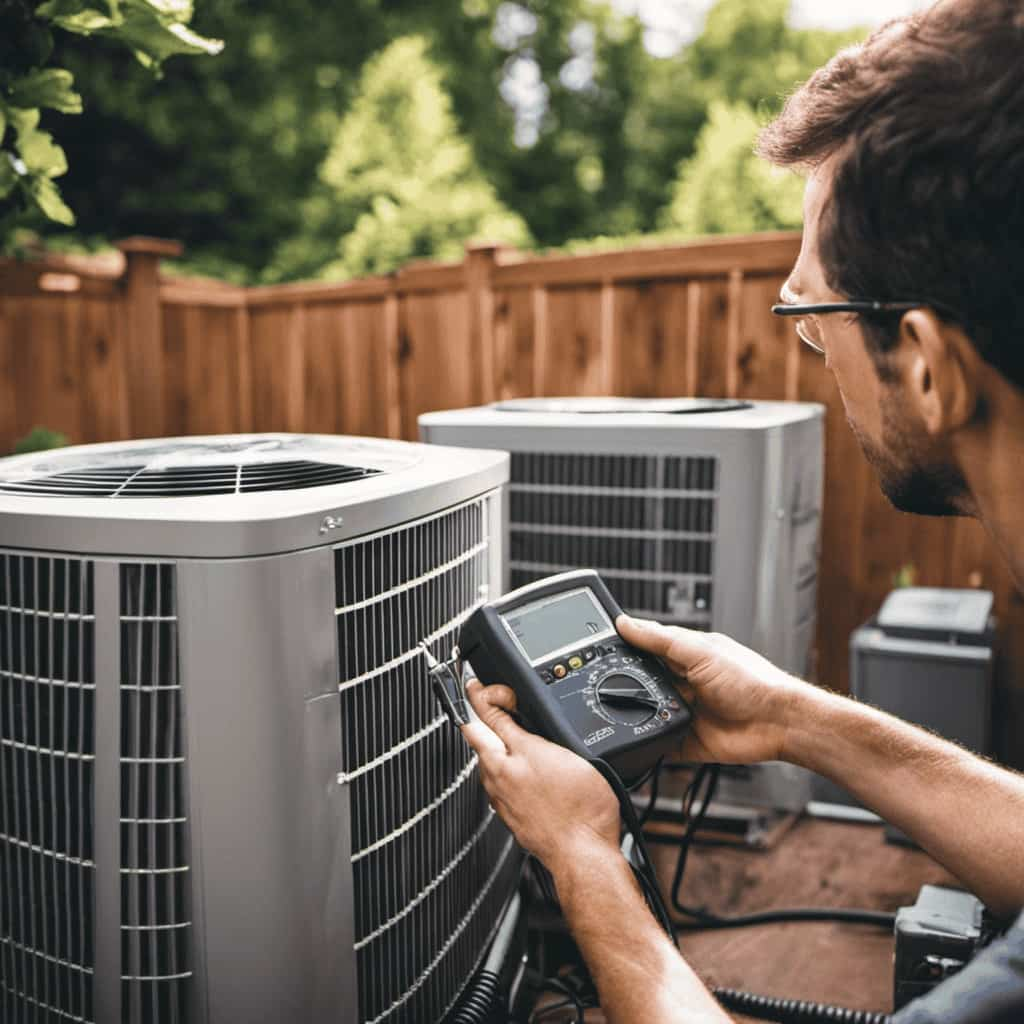
Superheat adjustment: By monitoring the superheat level, the expansion valve ensures optimal heat transfer efficiency and prevents issues like flooding or overheating.
To troubleshoot expansion valve problems or perform maintenance, technicians should follow specific techniques such as checking for blockages, inspecting the valve for any signs of wear or damage, and adjusting the valve for proper superheat levels.
Refrigerant Flow Regulation
When it comes to regulating the flow of refrigerant, the expansion valve plays a crucial role in a heat pump system. The expansion valve controls the flow of refrigerant by adjusting the size of the opening through which the refrigerant passes. This regulation is essential for maintaining the desired temperature in the heat pump system.
The expansion valve operates based on the principle of temperature control. As the refrigerant enters the expansion valve, it is in a high-pressure, high-temperature state. The valve reduces the pressure of the refrigerant, causing it to expand and cool down. This cooled refrigerant then enters the evaporator coil, where it absorbs heat from the surrounding air or water.
To better understand the process, let’s take a look at the following table:
| Pressure | Temperature | State |
|---|---|---|
| High | High | Liquid |
| Low | Low | Vapor |
As the refrigerant passes through the expansion valve, its pressure and temperature decrease, transitioning it from a high-pressure liquid state to a low-pressure vapor state.
The Importance of Proper Insulation in Heat Pump Efficiency
We can enhance heat pump efficiency by ensuring proper insulation throughout the system. Proper insulation offers several benefits that contribute to energy efficiency:
Reduced heat loss: Insulation helps to prevent heat loss by creating a barrier that prevents the transfer of heat from the system to the surrounding environment. This ensures that the heat generated by the heat pump is utilized effectively, resulting in improved energy efficiency.
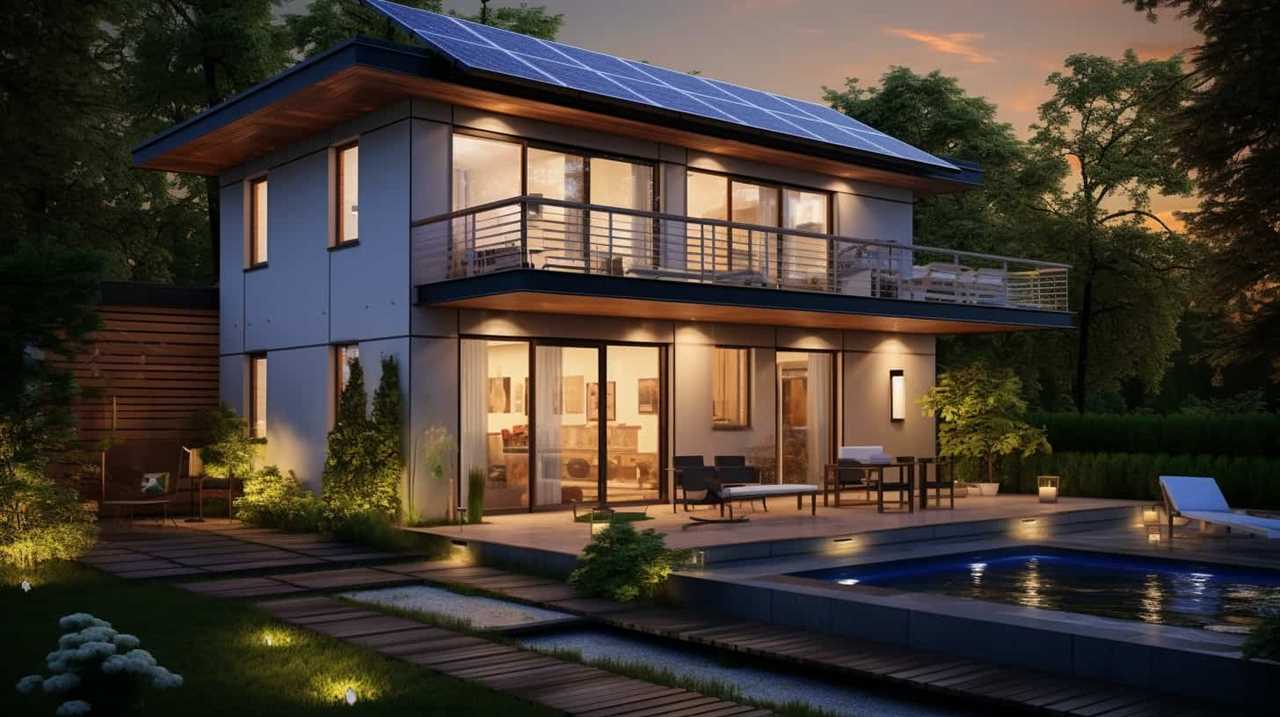
Increased system performance: With proper insulation, the heat pump can operate at its optimal temperature, allowing it to function more efficiently and effectively. This leads to better overall system performance and reduced energy consumption.
Enhanced comfort: Insulation helps to maintain a consistent temperature within the system, ensuring that the heat produced by the heat pump is distributed evenly throughout the space. This results in improved comfort levels for occupants, as well as reduced energy usage.
Long-term cost savings: By reducing heat loss and improving system performance, proper insulation can significantly lower energy bills over time. The initial investment in insulation is quickly offset by the long-term cost savings achieved through increased energy efficiency.
Examining the Role of the Reversing Valve in Heat Pump Operation
The reversing valve plays a crucial role in the operation of heat pumps by controlling the direction of refrigerant flow between the indoor and outdoor units. It’s responsible for switching the system between heating and cooling modes. When the heat pump is in heating mode, the reversing valve directs the flow of refrigerant so that the outdoor unit absorbs heat from the outside air and transfers it to the indoor unit. In cooling mode, the reversing valve reverses the flow, allowing the indoor unit to absorb heat from the indoor air and release it outside.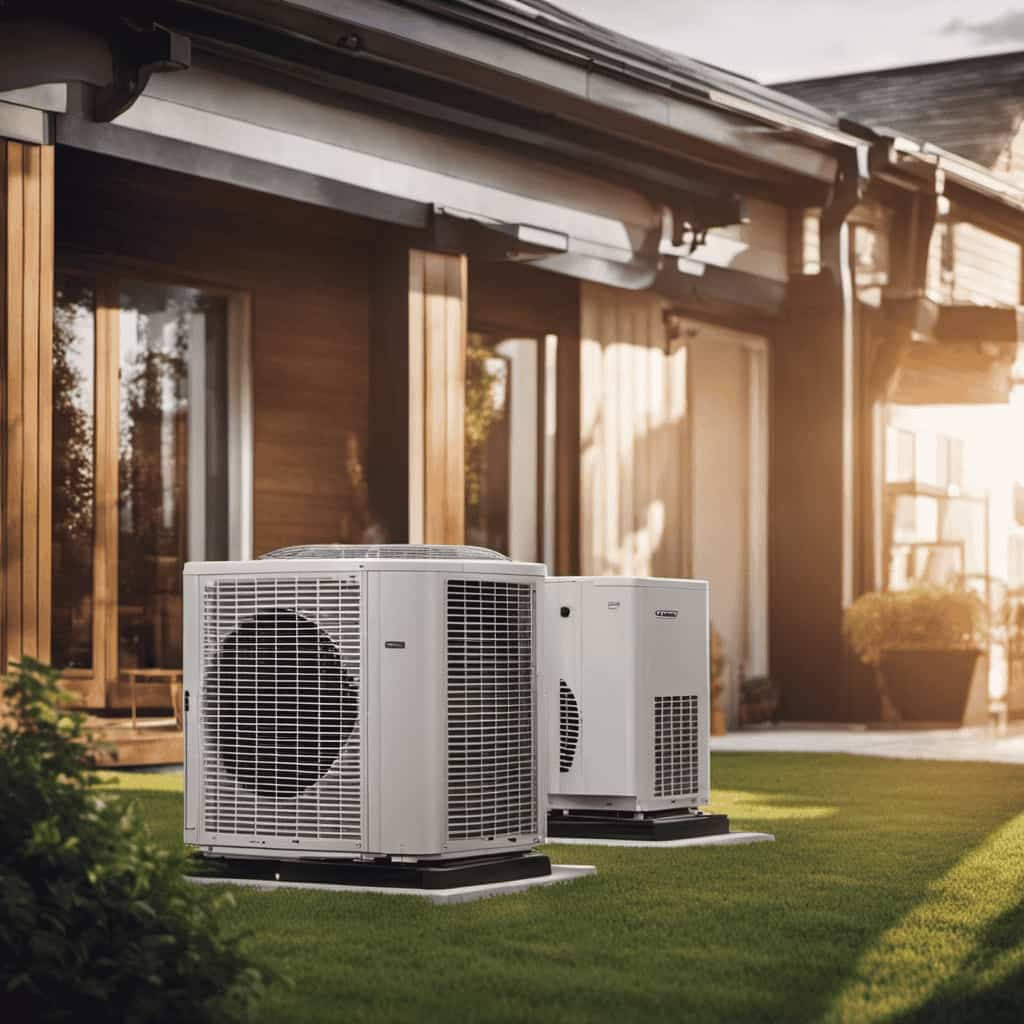
Troubleshooting the reversing valve involves checking for any leaks, ensuring that it’s properly connected and functioning correctly. Regular maintenance of the reversing valve includes inspecting the valve for any signs of wear or damage, cleaning it to remove any debris, and lubricating it if necessary. Proper maintenance and troubleshooting of the reversing valve are essential to ensure the efficient operation of the heat pump system.
The Impact of Refrigerant Types on Heat Pump Performance
To maximize heat pump performance, it’s important to consider the impact of different refrigerant types and how they affect efficiency and overall system operation. The choice of refrigerant is crucial as it can significantly impact the heat pump’s efficiency, environmental impact, and overall performance.
Here are four key factors to consider when selecting a refrigerant for a heat pump:
Efficiency: Different refrigerants have varying thermodynamic properties, which directly affect the heat pump’s efficiency. Some refrigerants may offer higher coefficients of performance (COP), resulting in better energy efficiency and lower operating costs.

Environmental Impact: The environmental impact of refrigerants is a critical consideration. Certain refrigerants, such as hydrochlorofluorocarbons (HCFCs) and chlorofluorocarbons (CFCs), have been phased out due to their contribution to ozone depletion and global warming. Opting for environmentally friendly refrigerants like hydrofluorocarbons (HFCs) or natural refrigerants can reduce the heat pump’s carbon footprint.
Safety: It’s essential to choose a refrigerant that’s safe for both the system and the environment. Some refrigerants pose risks such as toxicity, flammability, or high pressure. Selecting a refrigerant with a favorable safety profile ensures the heat pump operates reliably and minimizes potential hazards.
Availability and Cost: The availability and cost of refrigerants can vary significantly. It’s important to consider the availability of the chosen refrigerant and its impact on the overall cost of the heat pump system. Opting for widely available and cost-effective refrigerants can make maintenance and repairs more manageable.
Careful refrigerant selection is crucial for maximizing heat pump performance while minimizing environmental impact. By considering factors such as efficiency, environmental impact, safety, and cost, one can make an informed decision that serves both the system and the environment.

Troubleshooting Common Issues in Heat Pump Refrigeration Mechanics
When troubleshooting common issues in heat pump refrigeration mechanics, we often encounter problems related to refrigerant leaks and compressor malfunctions. These are two of the most common problems that can affect the performance of a heat pump system.
To diagnose and resolve these issues, it’s important to use effective troubleshooting techniques. When dealing with refrigerant leaks, it’s crucial to locate the source of the leak and repair it promptly. This may involve using leak detection tools and techniques such as pressure testing and visual inspections.
Compressor malfunctions can be caused by various factors, including electrical problems and mechanical failures. Troubleshooting techniques for compressor issues may involve checking electrical connections, testing motor windings, and inspecting the compressor for signs of wear or damage.
Frequently Asked Questions
How Much Does a Heat Pump Refrigeration System Cost?
Installing a heat pump refrigeration system can vary in cost depending on factors such as the size of the system and the complexity of the installation. However, it is important to consider the long-term benefits of energy efficiency.
Can a Heat Pump Be Used for Both Heating and Cooling?
Yes, a heat pump can be used for both heating and cooling. It offers energy efficiency and has a lower environmental impact compared to traditional heating and cooling systems.
What Is the Average Lifespan of a Heat Pump Refrigeration System?
The average lifespan of a heat pump refrigeration system depends on its maintenance requirements. Regular maintenance, including cleaning coils and replacing filters, can help extend the lifespan of the system.
Are Heat Pumps Suitable for All Climates?
Heat pumps can be suitable for all climates. Their efficiency allows for energy savings, making them a viable option in both hot and cold regions. We’ve discovered the secrets of their mechanics to serve you better.
Do Heat Pumps Require Regular Maintenance?
Yes, heat pumps require regular maintenance. It is important to follow a heat pump maintenance checklist and regularly check for signs of heat pump refrigeration system malfunction to ensure optimal performance and efficiency.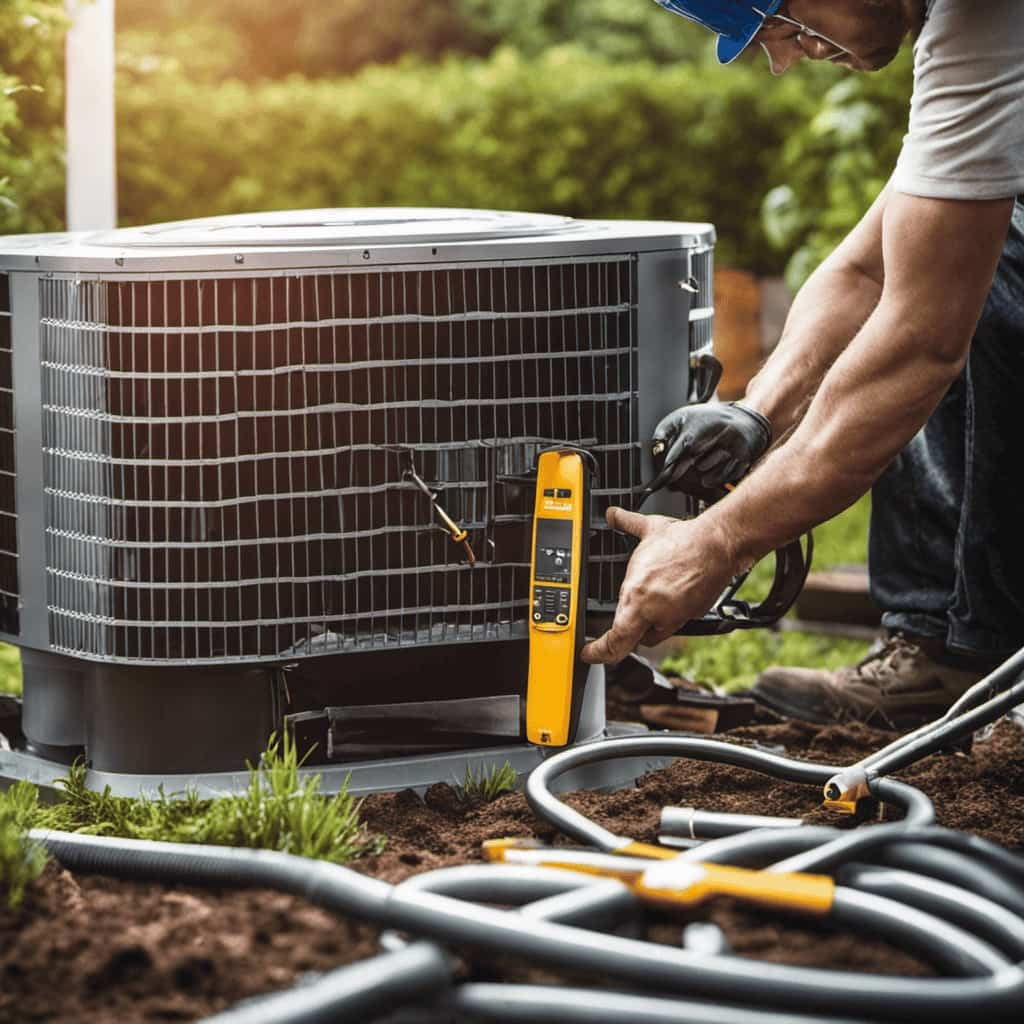
What Troubleshooting Tips Can Help Solve Heat Pump Problems in Refrigeration Mechanics?
When facing heat pump issues, refrigeration mechanics can rely on these helpful heat pump troubleshooting tips. Firstly, check for proper electrical connections and ensure the thermostat is set correctly. Then, inspect and clean the filters, coils, and fan blades regularly. It’s also crucial to ensure an adequate supply of refrigerant and check for leaks. Finally, perform routine maintenance and schedule professional inspections to prevent potential problems.
Conclusion
In conclusion, understanding the mechanics of heat pump refrigeration is crucial for optimizing efficiency and performance.
By comprehending the role of each component, such as the compressor, condenser, evaporator, expansion valve, and reversing valve, technicians can troubleshoot common issues and ensure proper operation.
Additionally, choosing the right refrigerant type and maintaining proper insulation further enhance heat pump efficiency.
As the saying goes, ‘Knowledge is power,’ and in the world of heat pump mechanics, this knowledge unlocks the secrets to successful operation and optimal performance.
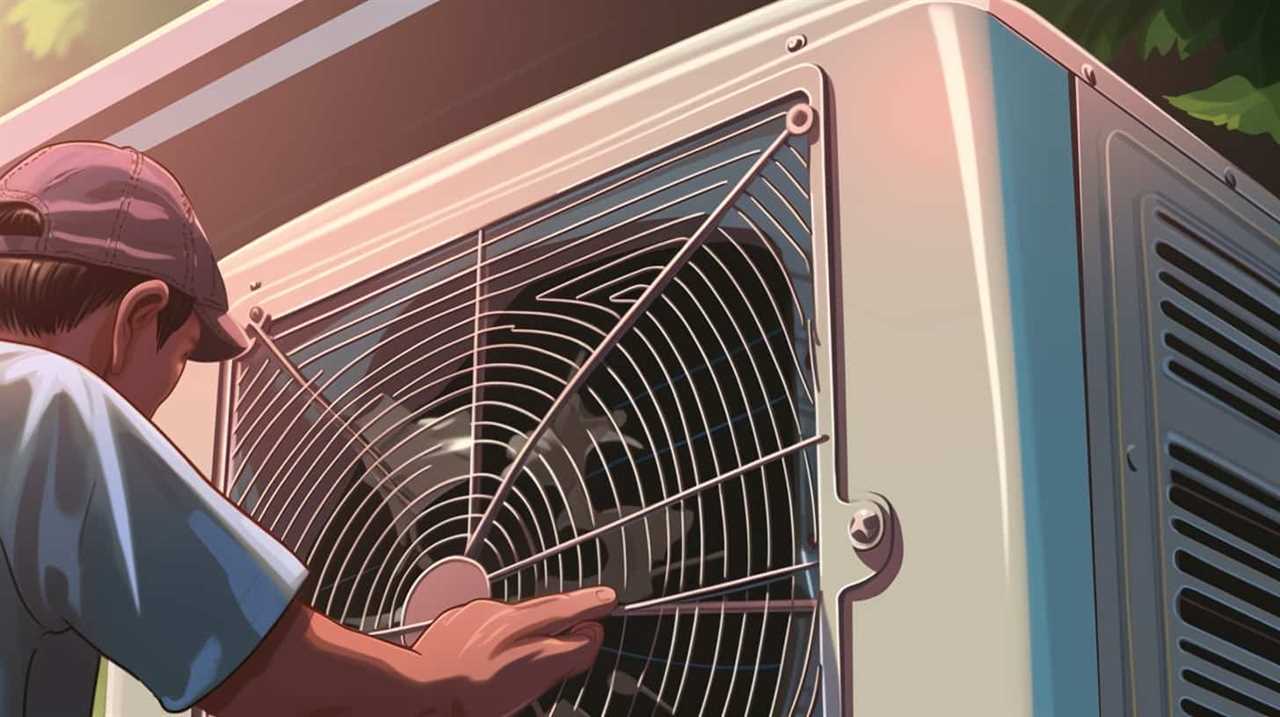
Installation and Maintenance of Heat Pumps
Top Companies for Heat Pump Maintenance and Installation

Welcome to our expert guide on the top companies for heat pump servicing and installation.
With our expertise and knowledge, we’ve carefully selected the most reliable and trusted companies in the industry. We understand the importance of a well-functioning heat pump system for your home, and we’re here to ensure optimal performance.
From professional maintenance to seamless installation, these companies guarantee quality, efficiency, and exceptional service tailored to your needs.
Let us help you find the perfect solution for your heat pump needs.
Key Takeaways
- Company A, Company B, and Company C are trusted companies with expertise in heat pump maintenance and installation.
- Expert installation is important for heat pump performance, as it ensures efficiency and longevity.
- Companies D, E, F, and G offer additional services and expertise in energy-efficient solutions, system optimization, and customer satisfaction.
- Companies I and II are known for cost-effective solutions, unmatched customer satisfaction, and innovative techniques.
Company A: Trusted Experts in Heat Pump Maintenance and Installation
We are impressed by the expertise and reliability of Company A in heat pump maintenance and installation. As trusted experts in the field, they’ve consistently provided reliable solutions to their customers.
With years of experience, Company A has developed a deep understanding of the complexities involved in maintaining and installing heat pumps. Their knowledgeable technicians possess the necessary skills to handle any issue that may arise. They’re meticulous in their work, paying close attention to detail to ensure that each installation is done correctly and each maintenance is carried out thoroughly.
Company A’s commitment to serving others is evident in their prompt response times and their dedication to customer satisfaction. Customers can trust Company A to provide them with the best solutions for their heat pump needs.
Company B: Providing Top-Notch Heat Pump Services for Your Home
When it comes to heat pump services for your home, Company B is a trusted industry leader.
Our team of expert heat pump technicians are highly experienced and knowledgeable, ensuring that your heat pump is in good hands.
With our top-notch services, you can have peace of mind knowing that your heat pump will be properly maintained and installed for optimal performance.
Trusted Industry Leader
Our team highly recommends Company B for their exceptional heat pump services for your home. With trusted industry certifications and a track record of high customer satisfaction ratings, Company B has proven themselves as a trusted industry leader in providing top-notch heat pump services.
Here are some reasons why they stand out:

Trusted Industry Certifications:
Company B holds certifications from reputable organizations in the heating and cooling industry, ensuring that they meet the highest standards of quality and expertise.
These certifications demonstrate their commitment to staying updated with the latest industry practices and technologies.
Customer Satisfaction Ratings:

Company B has consistently received positive feedback from their customers, with high ratings for their professionalism, efficiency, and customer service.
Their dedication to ensuring customer satisfaction is evident in the positive reviews and testimonials they’ve received.
When it comes to heat pump services for your home, you can trust Company B to deliver exceptional results and provide you with a seamless experience.
Expert Heat Pump Technicians
Our team highly recommends Company B for their expert heat pump technicians and their top-notch heat pump services for your home.
When it comes to heat pump troubleshooting, their technicians have extensive knowledge and experience in diagnosing and resolving common heat pump problems.
Whether it’s a refrigerant leak, faulty compressor, or issues with the thermostat, Company B’s technicians are skilled at identifying the root cause of the problem and providing effective solutions.
They’re detail-oriented and thorough in their approach, ensuring that your heat pump is operating at its optimal level.
With their expertise, they can quickly diagnose and repair any issues, saving you time and money.

Trust Company B for all your heat pump needs, and their technicians will provide exceptional service to keep your home comfortable year-round.
Company C: Experience Excellence With Our Heat Pump Maintenance and Installation Solutions
At Company C, we pride ourselves on providing reliable heat pump services and expert installation solutions.
With our wealth of experience and attention to detail, you can trust us to ensure the optimal performance and longevity of your heat pump system.
Whether you need regular maintenance or a new installation, our team is dedicated to delivering excellence in every aspect of our services.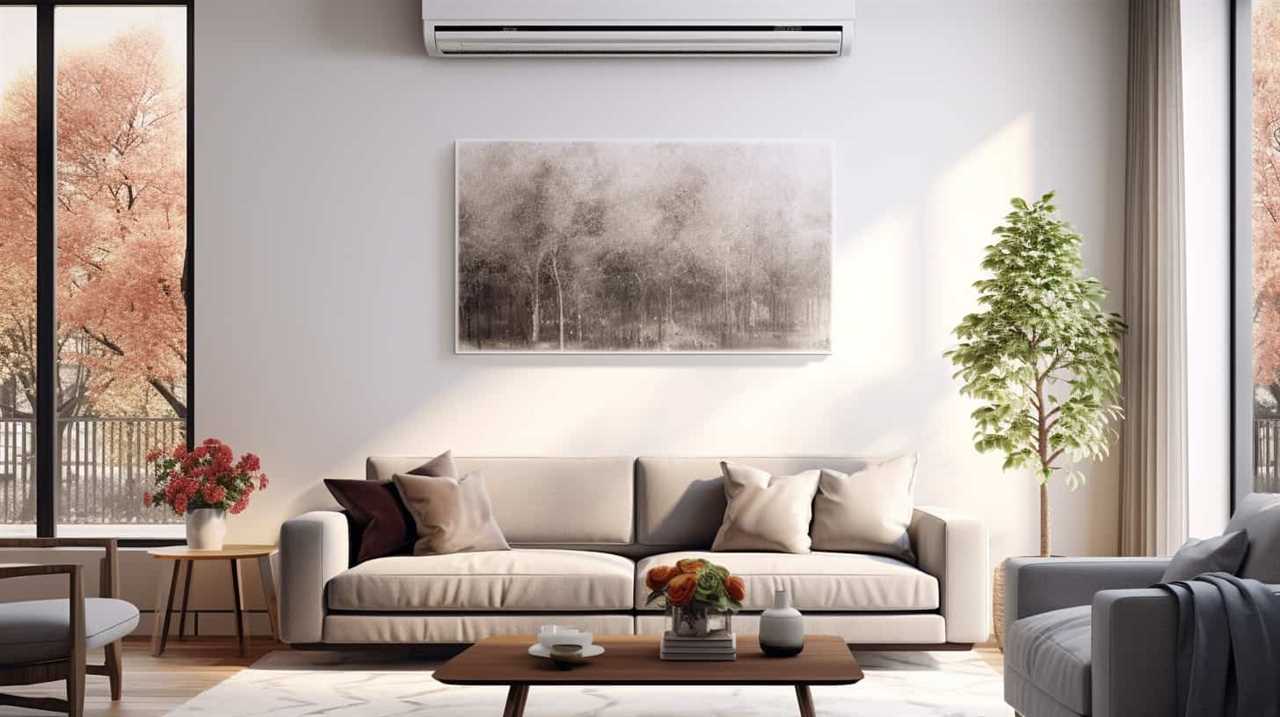
Reliable Heat Pump Services
We offer comprehensive solutions for heat pump maintenance and installation, ensuring that you experience excellence with our services. Our team of skilled technicians specializes in reliable heat pump repair, providing prompt and efficient solutions to keep your system running smoothly. We understand the importance of a properly functioning heat pump, and our experienced professionals have the knowledge and expertise to diagnose and repair any issues that may arise.
Additionally, we excel in efficient heat pump installation, ensuring that your new system is installed correctly and optimized for maximum performance. With our attention to detail and commitment to customer satisfaction, you can trust us to deliver exceptional results.
Transitioning into the next section, our expert installation solutions further enhance the reliability and efficiency of your heat pump system.
Expert Installation Solutions
With our years of experience and commitment to excellence, we offer top-notch heat pump maintenance and installation solutions that will ensure your system operates at its best. Our team of experts is highly skilled in providing expert installation tips and avoiding common installation mistakes that can hinder the performance of your heat pump.
We understand the importance of a properly installed heat pump, as it directly affects its efficiency and longevity. To help you understand the intricacies of heat pump installation, we’ve compiled a table below that highlights some key installation tips and common mistakes to avoid.
By following these guidelines and entrusting us with your heat pump installation, you can be confident that your system will operate flawlessly.
Now, let’s explore how Company D can further assist you with reliable heat pump maintenance and installation services.
Company D: Your Go-To Source for Reliable Heat Pump Maintenance and Installation Services
As homeowners, we understand the importance of finding a reliable company for heat pump maintenance and installation services, and that’s why Company D is our go-to source. With their expertise and experience in the field, Company D offers a range of benefits when it comes to heat pump maintenance.
Regular maintenance not only ensures the optimal performance and efficiency of your heat pump but also extends its lifespan. By entrusting your heat pump to professionals, you can have peace of mind knowing that it will be installed correctly and safely. Professional installation is crucial to avoid any potential issues or malfunctions down the line.
With Company D, you can rest assured that your heat pump will be in good hands.
Now, let’s move on to discussing Company E and how they ensure optimal performance through professional heat pump maintenance and installation.
Company E: Ensuring Optimal Performance With Professional Heat Pump Maintenance and Installation
To ensure optimal performance, we rely on Company E for professional heat pump maintenance and installation.
When it comes to optimizing heat pump performance, their expertise is unmatched. Their team of skilled technicians has extensive knowledge and experience in the field, ensuring that every installation is done with precision and attention to detail.
By choosing professional installation, customers can enjoy the benefits of a properly installed heat pump, including improved energy efficiency, reduced utility bills, and enhanced comfort.
Company E understands the unique needs of each customer and provides customized solutions to meet those needs. Their commitment to serving others is evident in their prompt and reliable service.
Trust Company E for all your heat pump maintenance and installation needs to ensure optimal performance and maximize the benefits of professional installation.

Company F: Quality and Efficiency Guaranteed in Heat Pump Maintenance and Installation
We can guarantee quality and efficiency in heat pump maintenance and installation by choosing Company F. With our extensive experience in the industry, we’ve proven our ability to provide cost-effective solutions while ensuring customer satisfaction.
Here’s why you should choose us:
Expert Technicians:
Our team consists of highly trained and certified technicians who’ve the knowledge and skills to handle any heat pump maintenance or installation project.
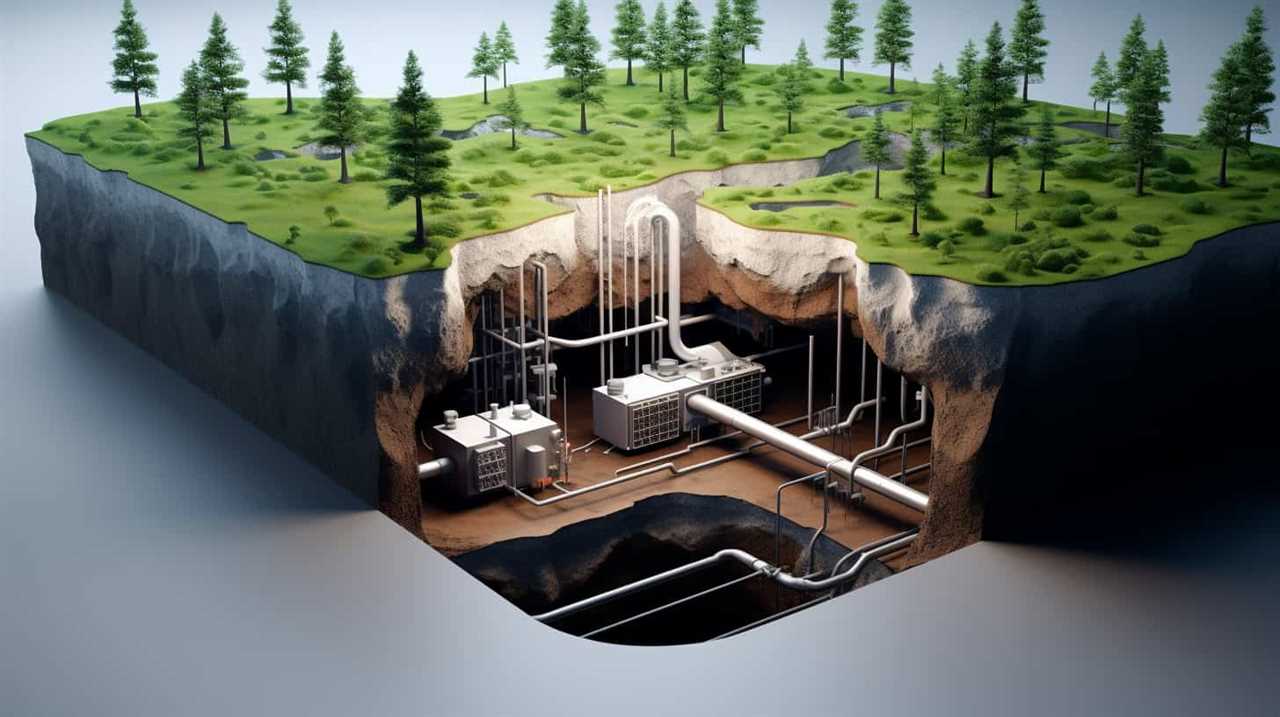
We stay updated with the latest industry trends and techniques to provide the best possible service.
Attention to Detail:
We pay close attention to every detail, from the initial assessment to the final installation or maintenance process.
Our meticulous approach ensures that your heat pump operates at its optimum level, saving you energy and money.

Company G: Expertise and Reliability in Heat Pump Maintenance and Installation
Our team at Company G prides itself on its expertise and reliability in heat pump maintenance and installation. With a stellar reputation in the industry, we’ve consistently delivered exceptional service to our customers, ensuring their complete satisfaction.
We understand the importance of having a properly functioning heat pump system, and our knowledgeable technicians are equipped with the skills and experience to handle any maintenance or installation job with precision and efficiency.
Our commitment to customer satisfaction is evident in the positive feedback we receive, as our clients appreciate our attention to detail and the personalized service we provide. We prioritize serving others and strive to exceed expectations in every interaction.
Now, let’s move on to discuss ‘Company H: Exceptional Heat Pump Services Tailored to Your Needs’.
Company H: Exceptional Heat Pump Services Tailored to Your Needs
With a focus on delivering exceptional heat pump services tailored to your needs, our team at Company H is dedicated to providing the highest level of customer satisfaction. We understand that maintaining your heat pump is crucial to its performance and longevity. Here are some heat pump maintenance tips to ensure optimal operation:
- Regularly clean or replace air filters to improve airflow and efficiency.
- Keep the outdoor unit clear of debris and vegetation to prevent airflow restrictions.
By following these maintenance tips, you can enjoy the benefits of regular heat pump maintenance, such as:
- Improved energy efficiency, resulting in lower utility bills.
- Longer lifespan of your heat pump, saving you money on replacement costs in the long run.
At Company H, we’re committed to serving you and meeting your heat pump needs.
Now, let’s explore the next section about ‘Company I: Industry Leaders in Heat Pump Maintenance and Installation’.

Company I: Industry Leaders in Heat Pump Maintenance and Installation
As industry leaders in heat pump maintenance and installation, our team at Company I offers top-quality services to ensure optimal performance and efficiency. We pride ourselves on providing cost-effective solutions for heat pump maintenance and installation, delivering exceptional results that meet our customers’ needs. Our experienced technicians are knowledgeable in all aspects of heat pump systems and are dedicated to providing the highest level of customer satisfaction in all of our services.
When it comes to heat pump maintenance, our team is skilled at performing regular inspections, cleaning, and tune-ups to keep your system running smoothly. We also offer efficient installation services, ensuring that your new heat pump is installed correctly and efficiently, maximizing its performance and energy savings.
At Company I, we understand the importance of customer satisfaction in heat pump services. That’s why we go above and beyond to ensure that our customers are happy with our work. We take the time to listen to their needs and provide personalized solutions that are tailored to their specific requirements.
Choose Company I for cost-effective solutions and unmatched customer satisfaction in heat pump maintenance and installation. Our team is dedicated to serving you and ensuring that your heat pump operates at its best.
Frequently Asked Questions
What Certifications or Qualifications Should I Look for in a Heat Pump Maintenance and Installation Company?
When it comes to heat pump maintenance and installation, it’s important to look for certifications and qualifications. These credentials ensure that the company is knowledgeable and experienced in providing quality service for your heat pump needs.
How Often Should I Have My Heat Pump Serviced?
We recommend having your heat pump serviced every year to ensure optimal performance. Regular maintenance can help prevent issues and catch any signs of heat pump failure early. Trust us, it’s better to be proactive than reactive!
Are There Any Government Rebates or Incentives Available for Heat Pump Maintenance and Installation?
There are government rebates and incentives available for heat pump maintenance and installation. It’s important to explore these options as they can help offset the costs and make energy efficient choices more affordable.
What Factors Can Affect the Lifespan of a Heat Pump?
Factors affecting a heat pump’s lifespan include regular maintenance, proper installation, and usage habits. To maintain efficiency, keep filters clean, ensure proper airflow, and schedule professional tune-ups. Our experience shows these tips extend the life of your heat pump.
Can You Provide References or Testimonials From Previous Customers Who Have Used Your Heat Pump Maintenance and Installation Services?
Yes, we can provide references and testimonials from satisfied customers who have used our heat pump maintenance and installation services. Our high customer satisfaction rates reflect our commitment to industry standards and serving others.
Which Companies Offer the Best Prices for Heat Pump Installation and Maintenance?
When it comes to heat pump installation and maintenance, several companies are known for offering the best prices. These companies specialize in providing top-notch services at competitive rates. By opting for their expertise in heat pump installation and maintenance, customers can ensure cost-effectiveness without compromising on quality.
Conclusion
In conclusion, when it comes to heat pump maintenance and installation, trust is paramount. With our trusted expertise, top-notch services, and commitment to excellence, we ensure optimal performance and reliability for your heat pump.
Our industry-leading team of experts provides tailored solutions that guarantee quality, efficiency, and exceptional service. Choose us as your go-to source for all your heat pump needs, and experience the difference of working with knowledgeable and experienced professionals.
-

 Residential and Commercial Applications3 months ago
Residential and Commercial Applications3 months agoBest Amana Heat Pump Reviews
-

 Thermal Energy Transfer3 months ago
Thermal Energy Transfer3 months agoBreakthroughs in Modern Heat Pump Systems: Thermal Energy Edition
-

 Residential and Commercial Applications3 months ago
Residential and Commercial Applications3 months agoBest Heat Pump
-

 Geothermal Heat Pumps2 months ago
Geothermal Heat Pumps2 months agoUpgrade Your Comfort with Our Efficient HVAC Systems
-

 Geothermal Heat Pumps2 months ago
Geothermal Heat Pumps2 months agoInnovative Geothermal Heat Pump Manufacturers Revolutionize Energy Efficiency
-

 Air Conditioning4 weeks ago
Air Conditioning4 weeks agoExploring Energy-Efficient Air Conditioning Heat Pumps
-

 Thermal Energy Transfer3 months ago
Thermal Energy Transfer3 months agoBoost Your Heat Pump Efficiency: Interactive Guide
-

 Residential and Commercial Applications3 months ago
Residential and Commercial Applications3 months agoBest Portable Heat Pump Heat & AC











